Half a world cruise on Queen Mary 2. Find part 1: leaving Sydney, part 2: cruising around south Oz and part 3: sea to island hopping. Caught up? Enjoy the next quarter!
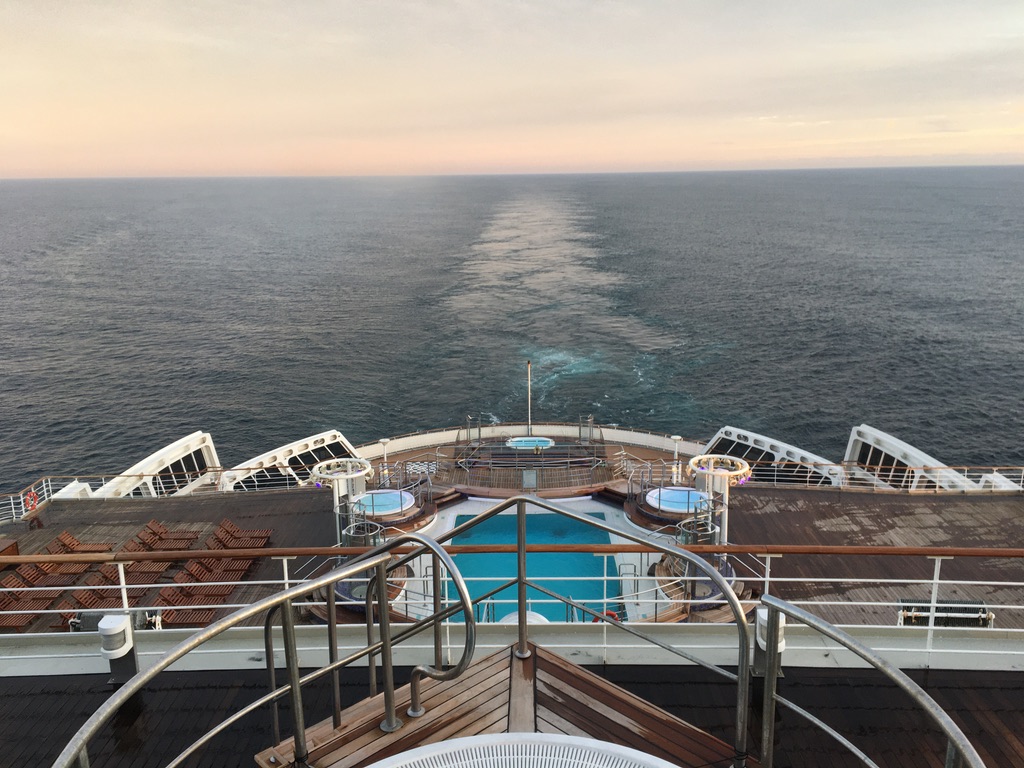
Day 21 – at sea – Routine back in full power, together with satisfying work on my writing project. After dinner, tablemate Elaine and I ran to the cinema, from one end of the ship to the other. I was wearing one of my excellent wraps (gifted to me as Kate Winslet cosplay) which I held flying behind me like a cape. It was glorious and funny and, as we pounded through the plush carpet of the grand foyer, I began to hum the old tv theme from Batman between chortling gasps. Our fellow cruisers, some leaning on their walking sticks, looked on with approval. Flying within the QM2. Speaking of flying, you may be interested to learn that airlines are expecting a much greater profit this year. How are you travelling?
Arriving just in time, we watched a film set in Port Isaac where I had a WorkAway booked in a month. My tablemate, Elaine, had been there recently. Her photos, showing locations we’d just seen in the silly film, brought my future into sharp existence. There would be an end to this cruise, and I would be there, in Cornwall, in the film, with rugged coastline and cold outcrop of hard buildings nuzzling into cliff-edged harbour. The port featured one of those constructed sea wall barriers that must have been an engineering marvel in its conception, just as surely as it must have killed a percentage of its builders. What with Doc Martin and the Fishermen’s Friends, there’ll be tourists in them there hills. Reassuringly, Elaine seemed to have enjoyed her experience there. And there’d be Cornish pasties.
There was sea to cover. Tomorrow would be an early start. Up, dressed, coffee, breakfast at 05:50, meeting at Royal Court Theatre to read my book while we wait in a queue before we landed in
SOUTH AFRICA
– a place I never imagined I’d ever go.
DAY 22 – DURBAN
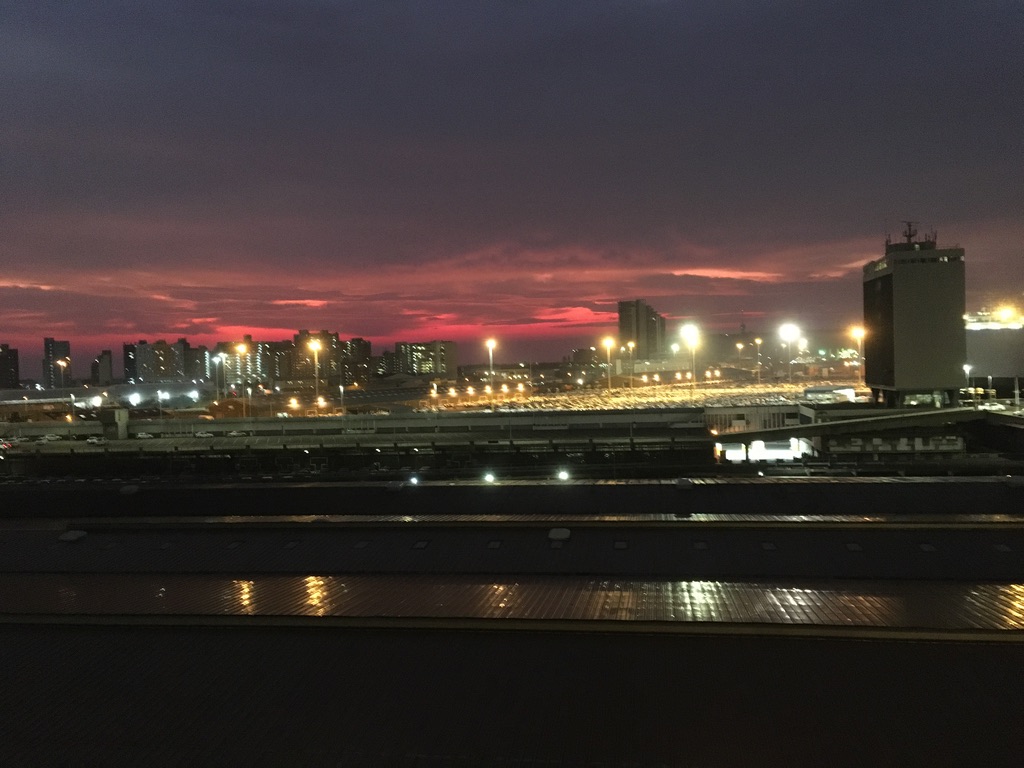
Woke as we began to enter the harbour around 03:00. Finished reading Donna Leon and began to prepare. From the ship the city looked big (4.3 million souls). The large office buildings looked like big black flags as we entered the harbour in the early morning darkness. They did not have their lights switched on. There was a deep red smear across the sky which warned of rain – I considered my raincape, but we were only out for the morning. Cruise passengers wouldn’t have to worry about the weather. Expected 29 degrees.
Litter lay like crocodile skin on the water.
Very grateful kitchen opened for toast and marmalade. Waited in quiet theatre with murmuring ‘guests’ in comfy seats waiting, waiting, waiting, for Border Control.
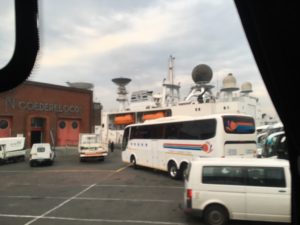
Once in our bus, we drove through the port of Durban. The streets were littered and the buildings were covered in scraps and the bus shelters were enormous and littered. People were everywhere, ignoring the litter. Our tour guide, white and elderly, had splendid memories of the old days when everything was great. He said he tried hard to avoid speaking of politics but could not help veering back into his opinions about corruption in government: from road builders right up to international policy. He would start talking about educational progress and swerve right into his strong opinions again. He was a real downer. Perhaps that is South African life.
Trevor Noah billboards grinned from the tall sides of buildings. Could his show cheer folk up?
I felt some cynicism regarding my game reserve Shore Experience, perhaps influenced by this guide. There’d be two more tours going to the same place later in the day. Would it just be a photo opportunity to see a wild animal in a farm? Well, yes. But how could I say I’d been to South Africa and not seen a beast?
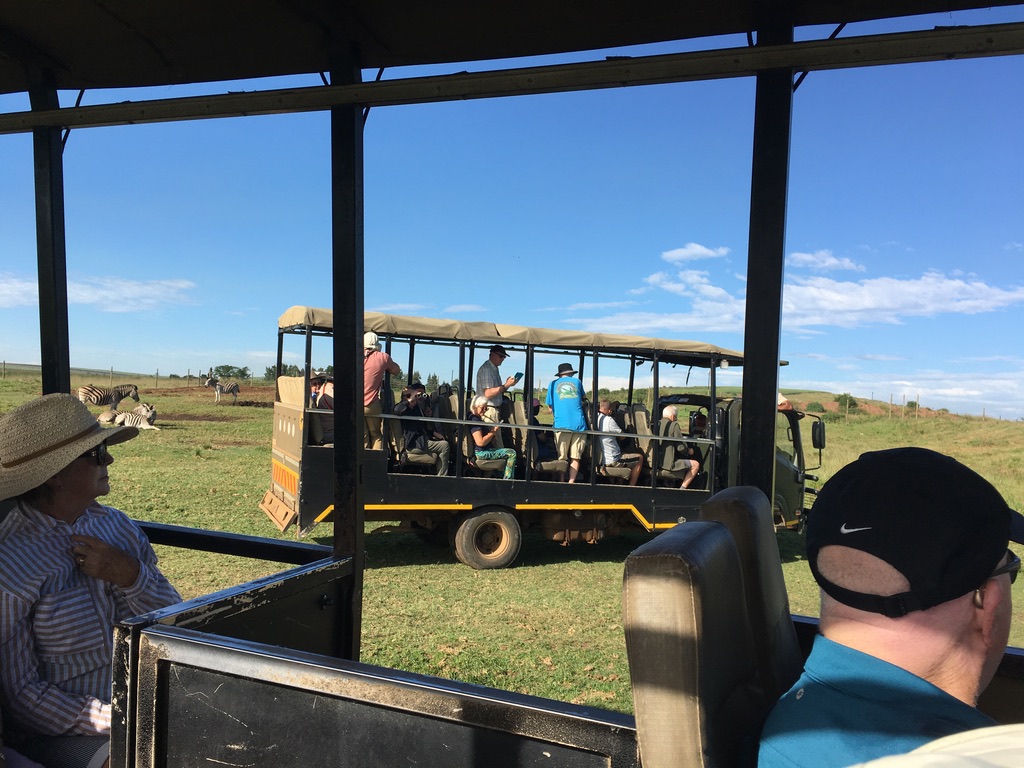
We arrived and piled into ‘jeeps’. Tala Wildlife Reserve was a sort of open plains zoo where herds of zebra and wildebeest roamed together with impala and rhinos (with sawn off horns to prevent poaching).
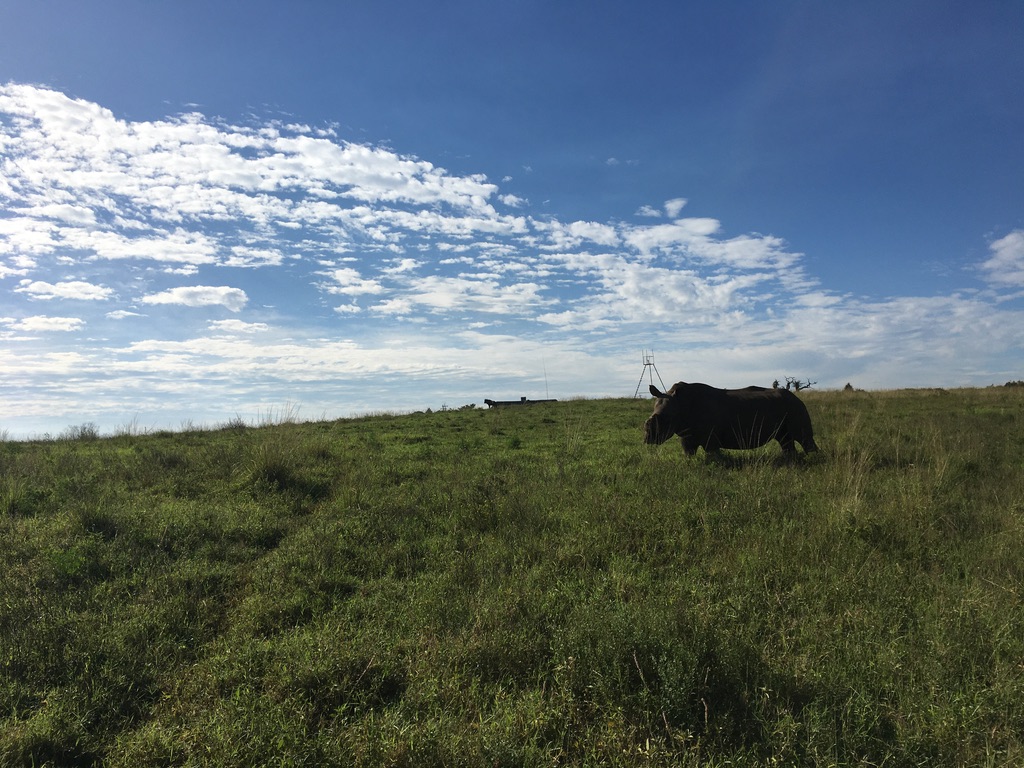
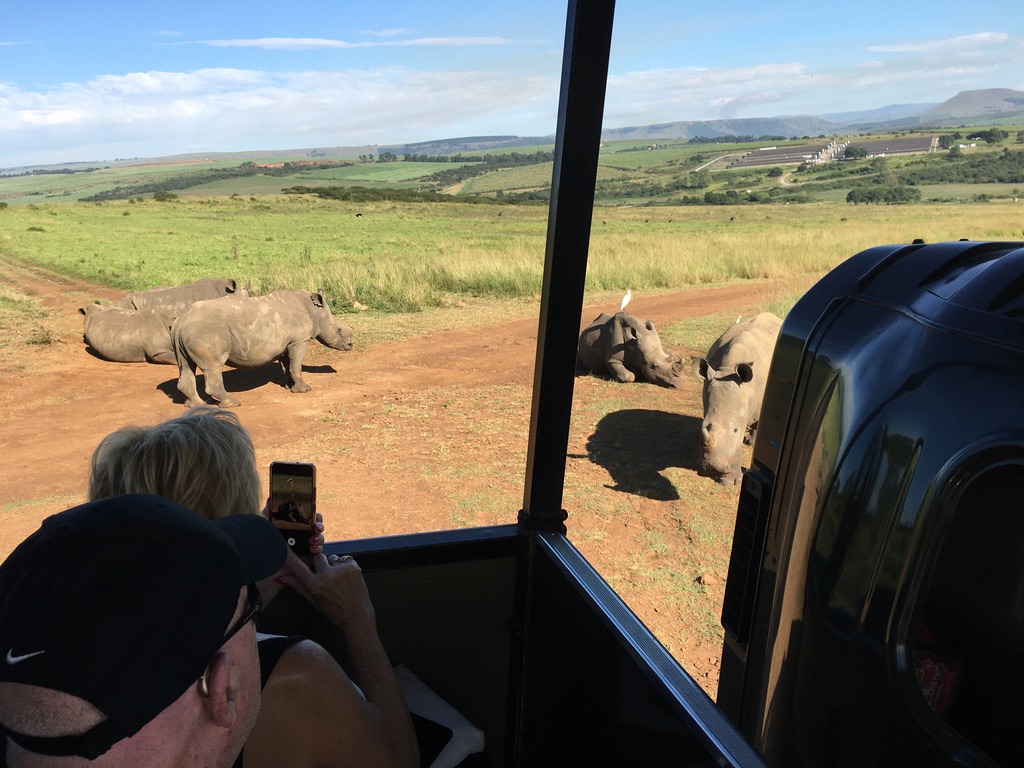
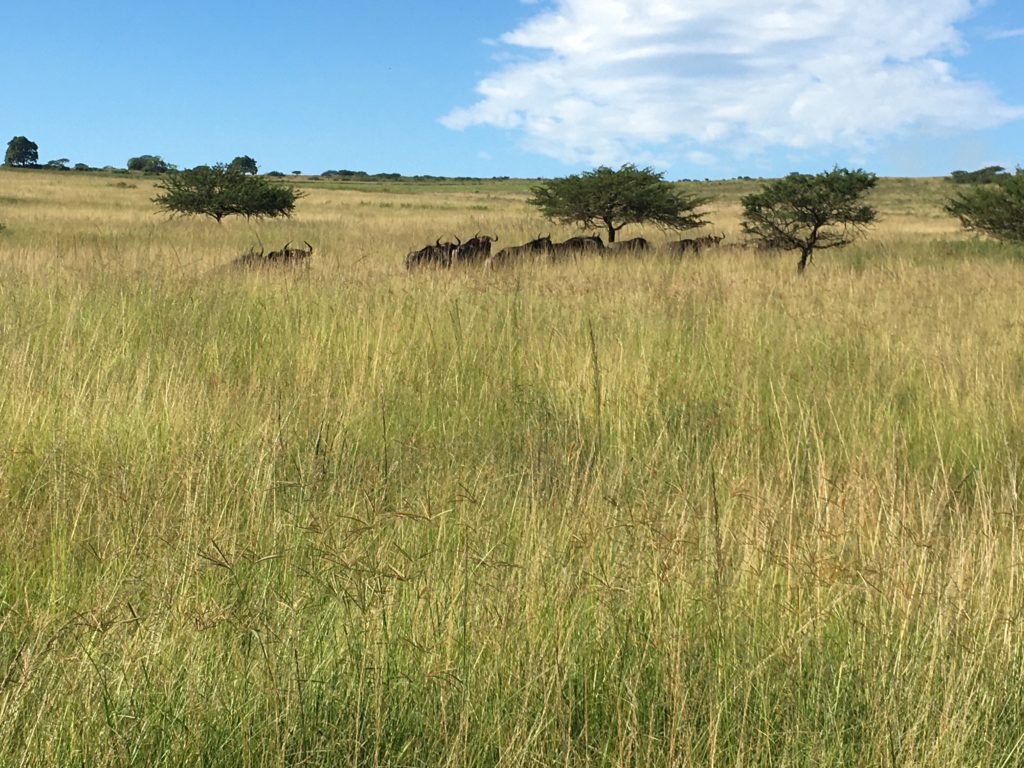
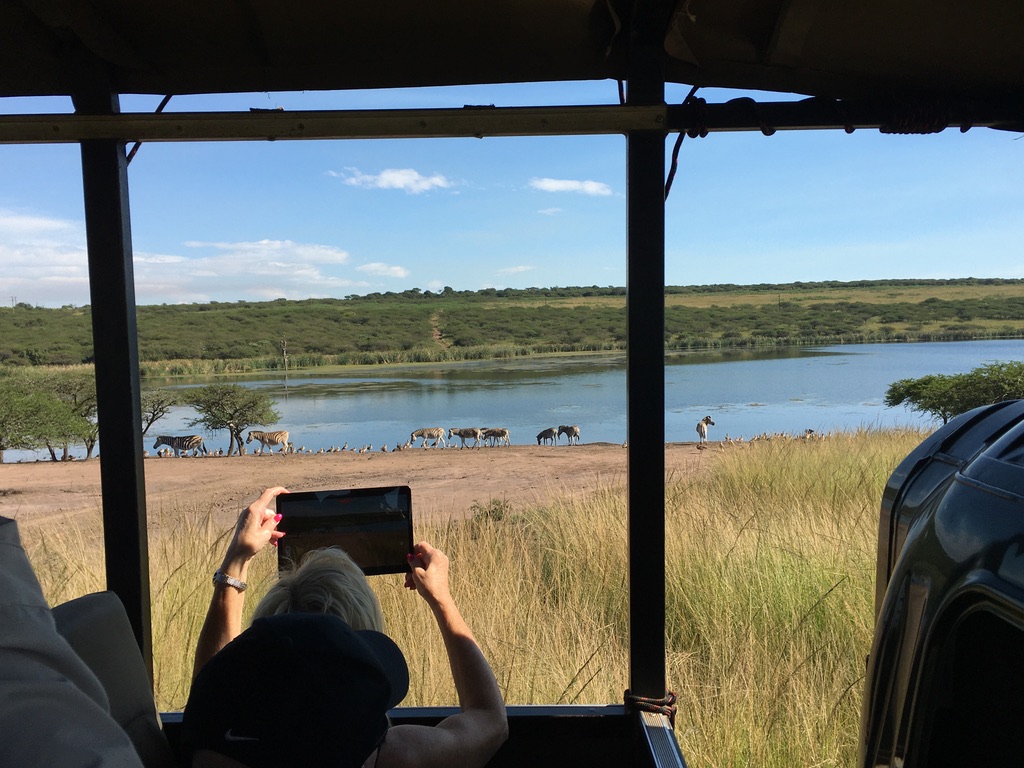
And then there were giraffes. They came quietly, elegantly, down the hill towards us. Like goddesses or spirits, swaying forwards and backwards as they roamed.
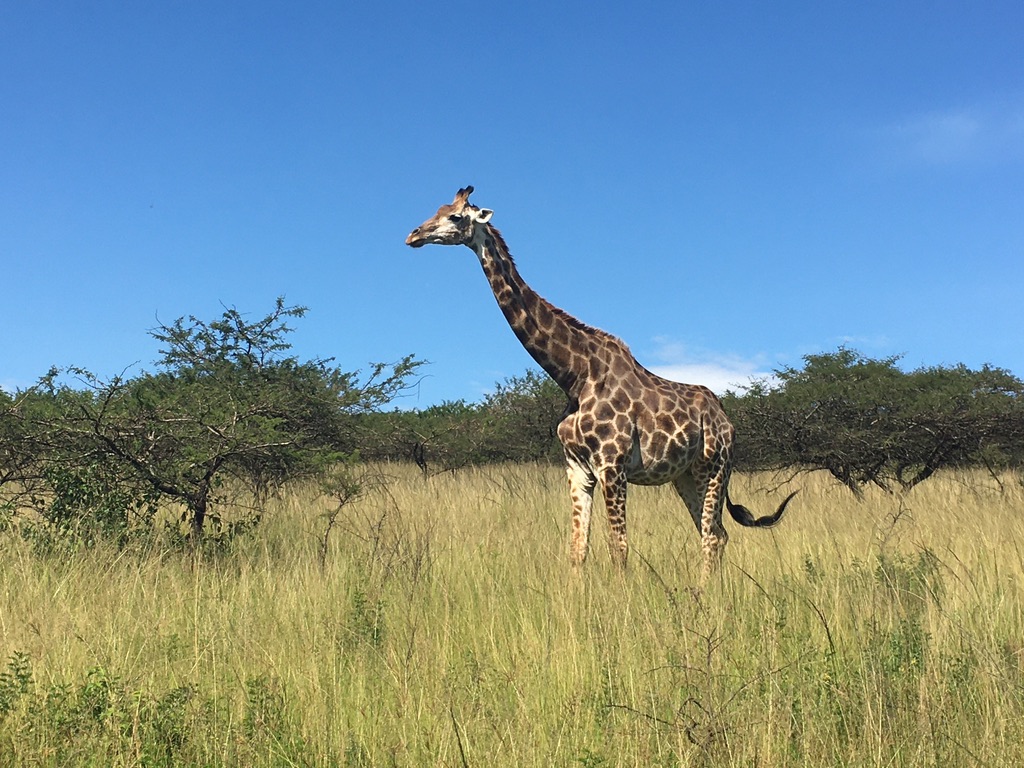
What beautiful creatures. Beautiful.
The giraffes decided to keep going, bypassing their optimal viewing station, so our driver stopped the truck, got out to run down to the river and flush them up to us tourists. Only, he left our open-sided jeep running and the fumes (you’d think we’d be used to diesel fumes, wouldn’t you), started to annoy some of our more sensitive ‘guests’. He was gone for quite a while and soon people began to stand and worry and debate and eventually moved to turn the engine off. These ‘jeeps’ are built on the bed of a five-ton truck. We sat in silence and watched the chased giraffes run back and mingle where they ought and the other jeeps were afforded good picture opportunities as well.
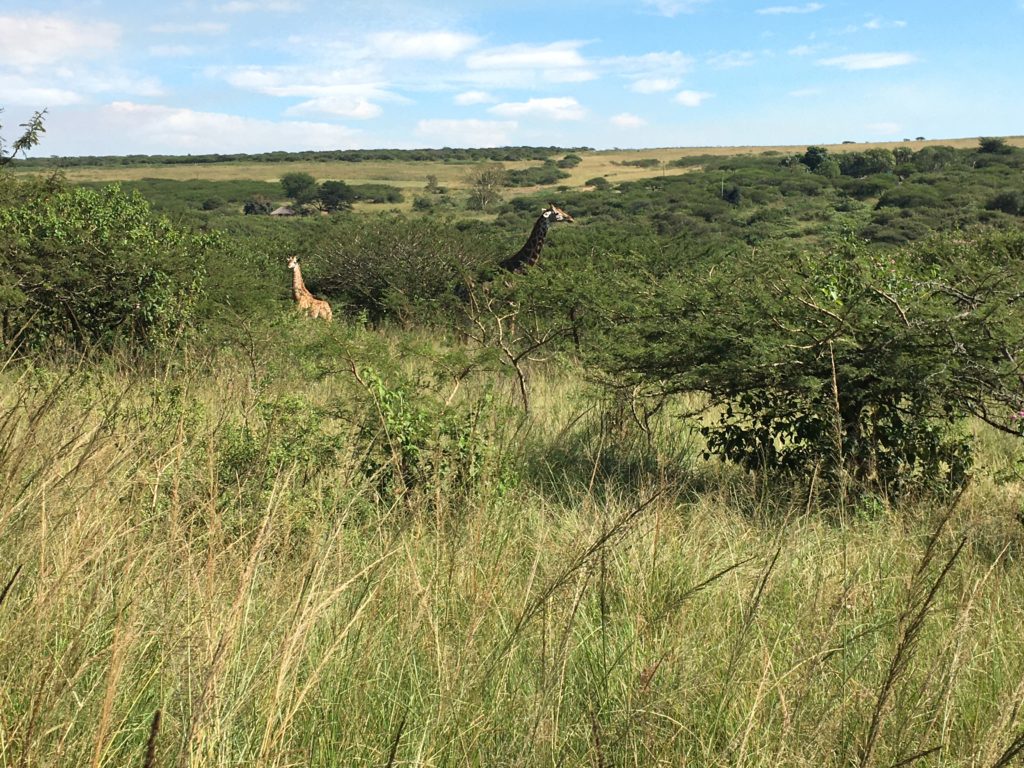
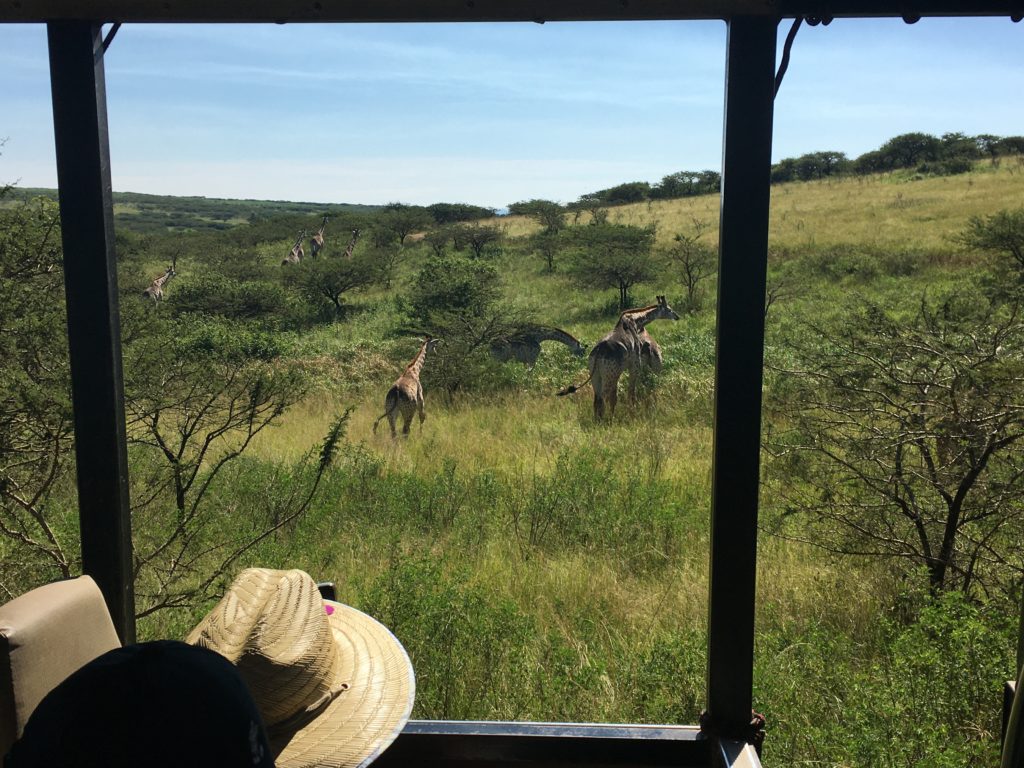
Sadly, on his return, our driver knew right away he would have to push the sturdy vehicle to get it started. And, after turning on the key, being a valiant fellow, he began to heave. Only the heavy machine rolled back into a muddy puddle. A muttering became consensus and all the blokes leapt to their feet. (Some of the men got to their feet.) Some of the wives gave their fellows an elbow in the ribs. Many of the males made it outside to give an old heave ho. I will tell you I had my pack wrapped around my legs so it wouldn’t fall out of the open sided ‘jeep’. I promise you I was trying to disentangle the awkward macrame so I could get out and be useful too, struggling with my knotted legs and climb over the American bird lover beside me, when all of a sudden, the engine roared and the gents clambered back on board to get a pat on the knee from their admiring partners. I really would have helped …
As cameras clicked and jaws slackened, the driver climbed out of his cabin and made his way around the outside of the cage, leaning up against where I sat. I asked him if these were the sort of animals that might have lived in this area before white invasion? Oh, yes, absolutely. We could see the large chicken farm across the road. I meant to ask him about indigenous plants and grasses – given this had been cattle producing farmland only a few years before – but we had to move on. There were small acacias around the hippo pool. I think I saw some hippo eyes, but the sea eagle distracted me.
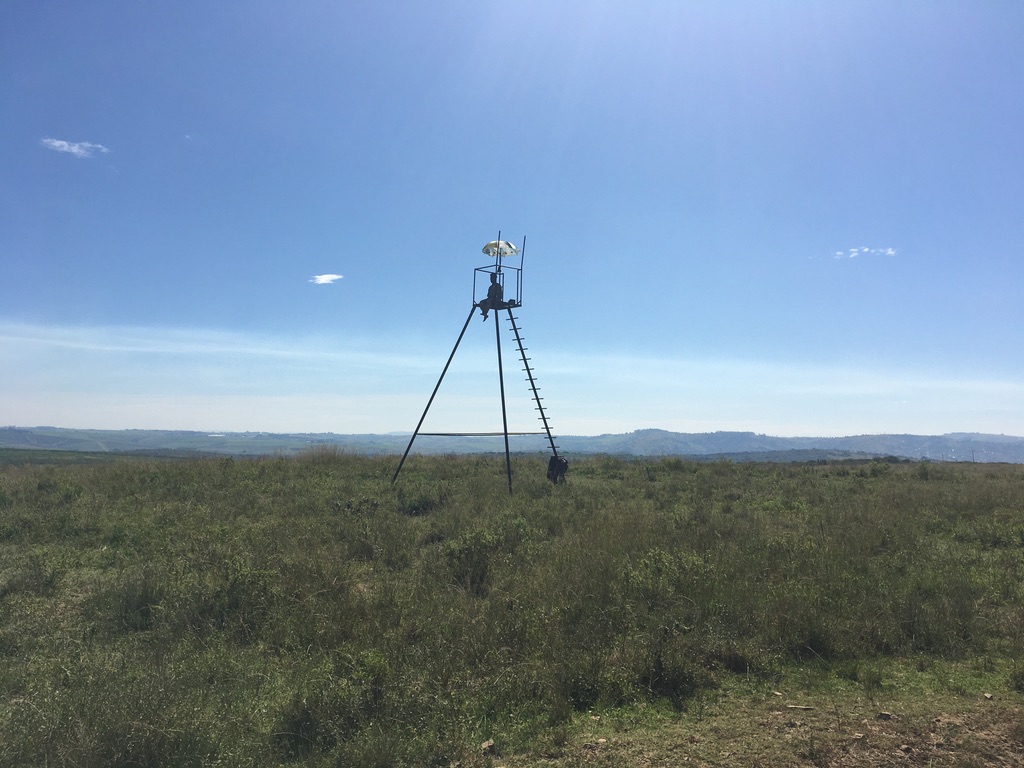

Our continually depressing drive through the outskirts of the city back to port took us past many low chicken farms. I saw no solar panels and no wind turbines visible from the bus windows. Our guide said much of the electricity came from diesel generators.
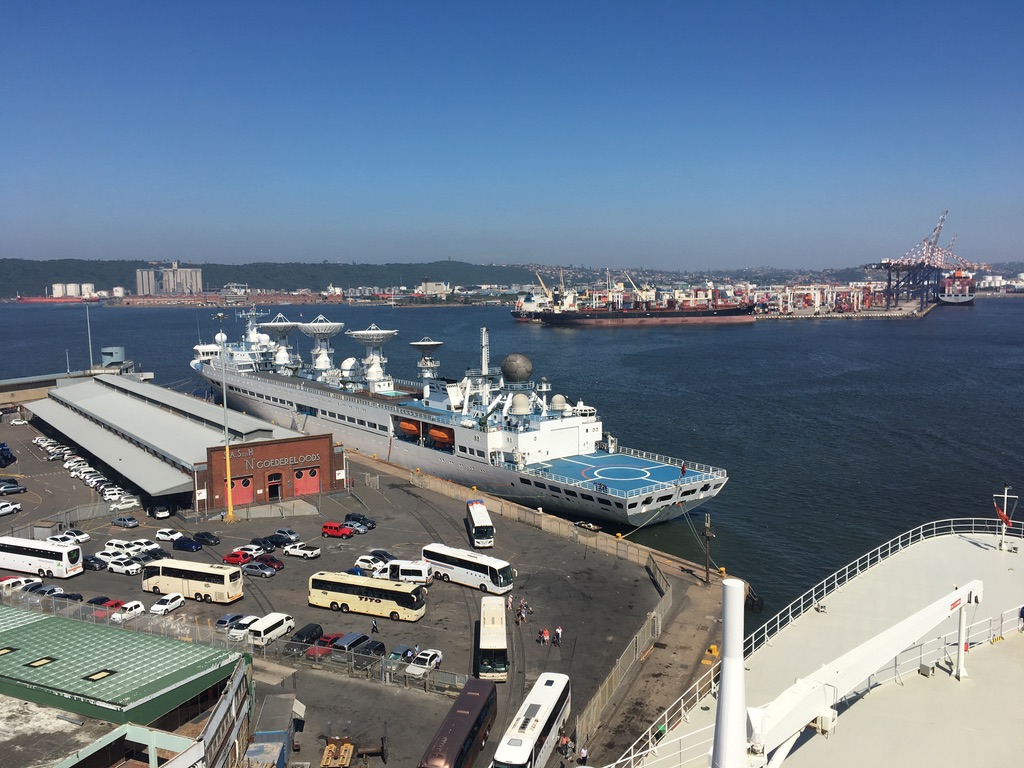
DAY 23 – at sea – When life stays at the same ship’s time, the gym is almost empty on opening, also a bonus for my ‘office’ (the Chart Room with no charts) and my morning routine went along as normal until I signed up for the Galley Tour with Executive Chef James Abhilash.
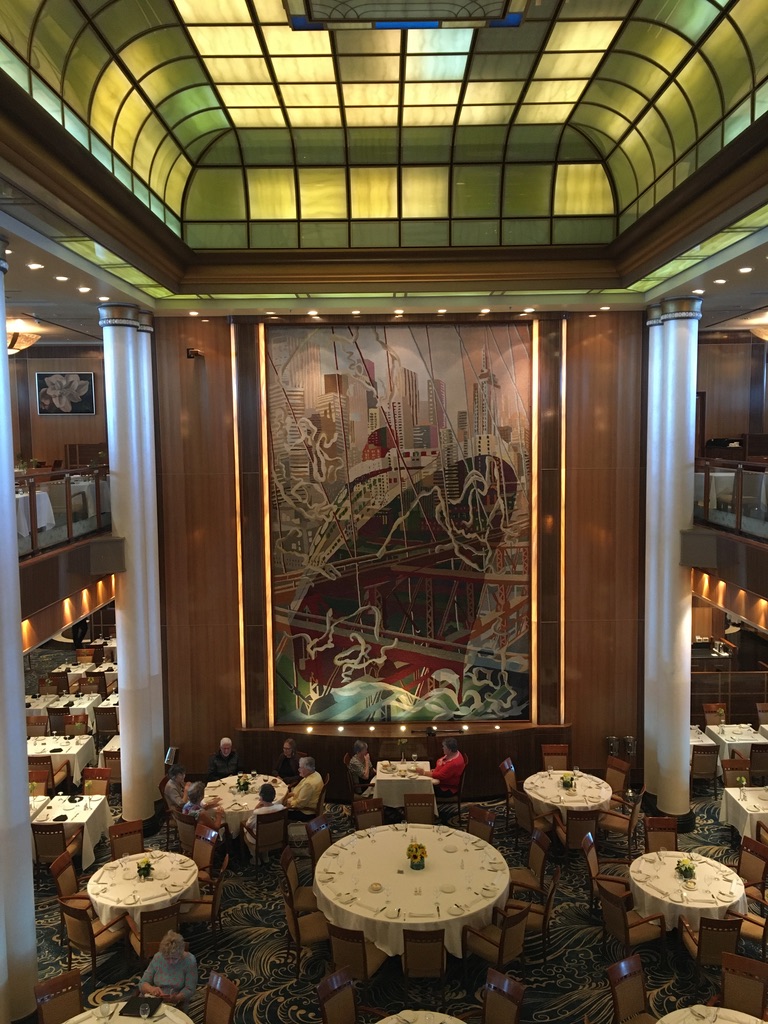
A few hundred ‘guests’ sat in the dining room, waiting, waiting, for the chef’s talk and then, divided into smaller groups, paraded single file through the Britannia kitchen rotating doors with cameras/phones at the ready.
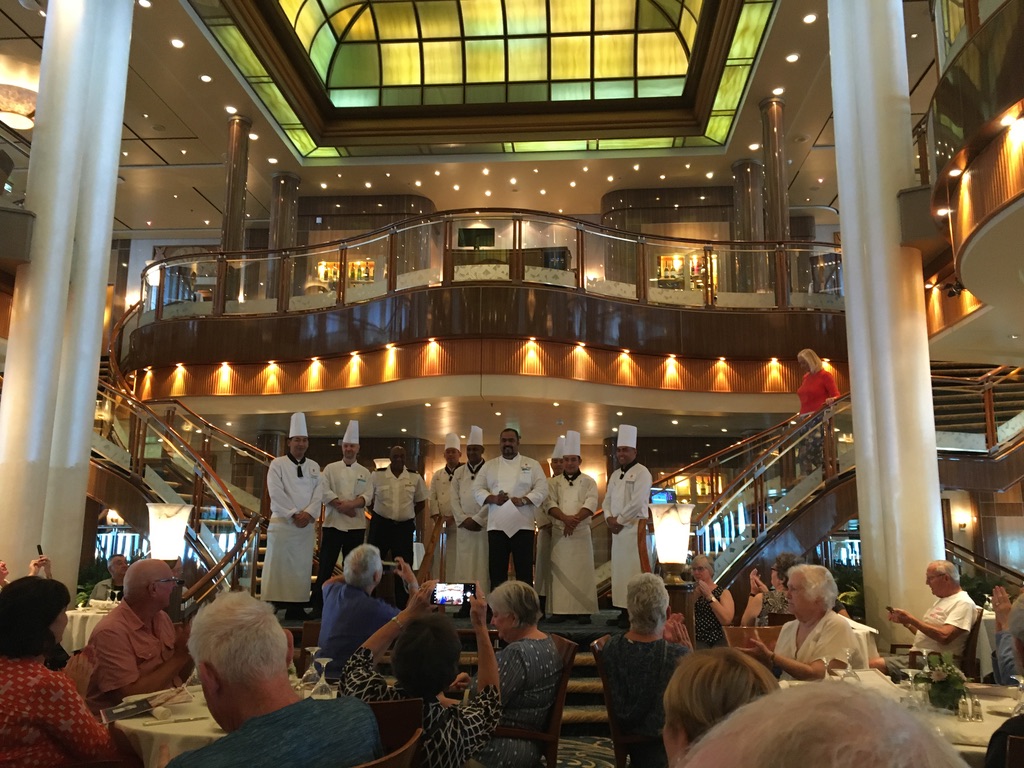
On board the QM2 there’s the Queens and Princess Grills and King’s Court, the Steakhouse, Room Service and the Crew Galley as well as the Boardwalk, a little burger/hot dog joint up on the sports deck. The Britannia kitchen is huge, stainless steel and spotless. There’s hundreds of staff walking around: major cleaning happens overnight with constant clean-ups through the day, plus the more picturesque chopping, stirring, plating, serving and then more cleaning. Nothing is left to chance. The orders are supervised to the last minute to avoid waste.
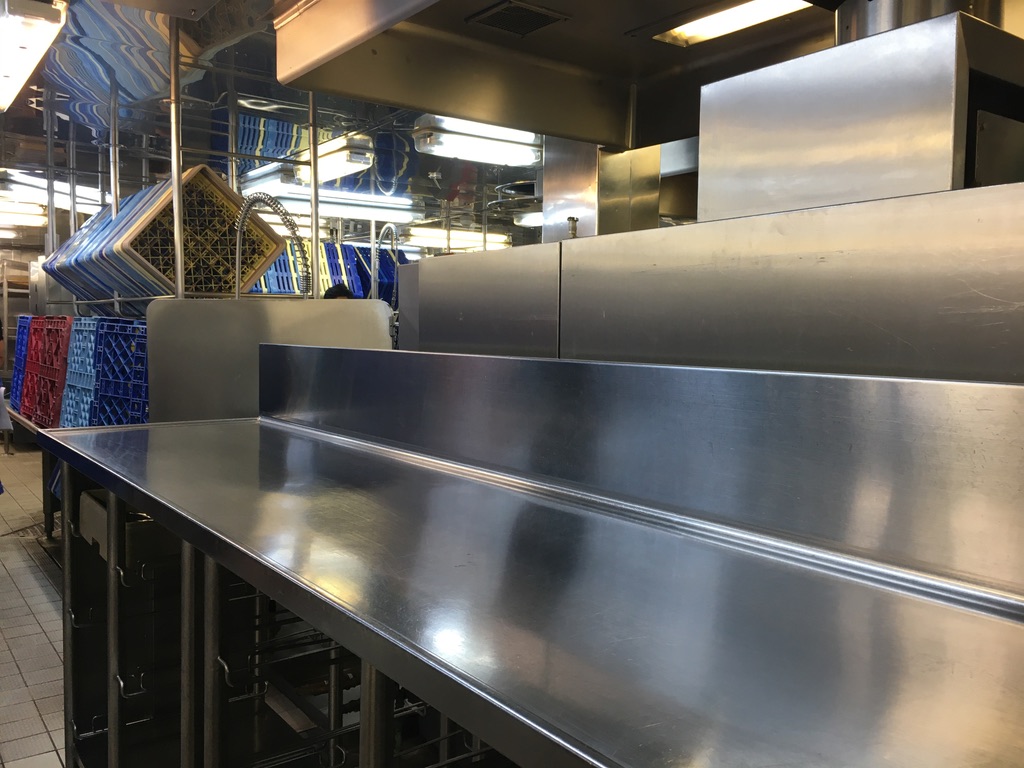
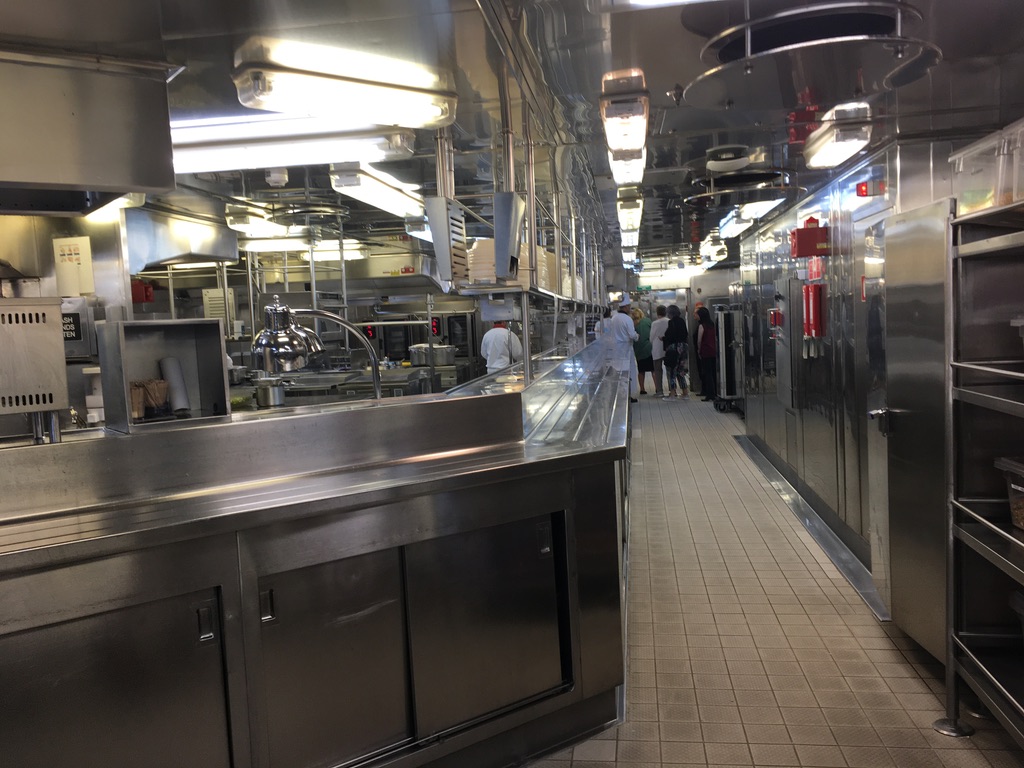



Potable water is created by 3 huge salt water plate evaporators. They process around 1900 tons of water for crew and guest showers plus all the drinks. The water is treated and filtered numerous times, especially by the time they arrive in the drink machines in the restaurants.
There are 157 chefs on board of different ranks and specialities, and there’s 85 support staff such as dishwashers and cleaners under the supervision of the Galley Manager. Plus there’s 13 strong Provision Team headed by the Inventory Manager. There’s 21 refrigerated and frozen rooms for storage. About 16,000 meals are eaten every day – with attendant plates, cutlery and linen to be washed.
For us passengers, there’s only entertainment. Sadly, 680dotcom’s first attempt to try shuffleboard was cancelled due to wind. Tried afternoon Trivia but remembered nothing. Back to work. Then decided to try the plant-based option in the room service menu. Fast and delicious. Watched a movie about Val Kilmer. Persistence. Serious intense man with throat cancer – continuing to strive.
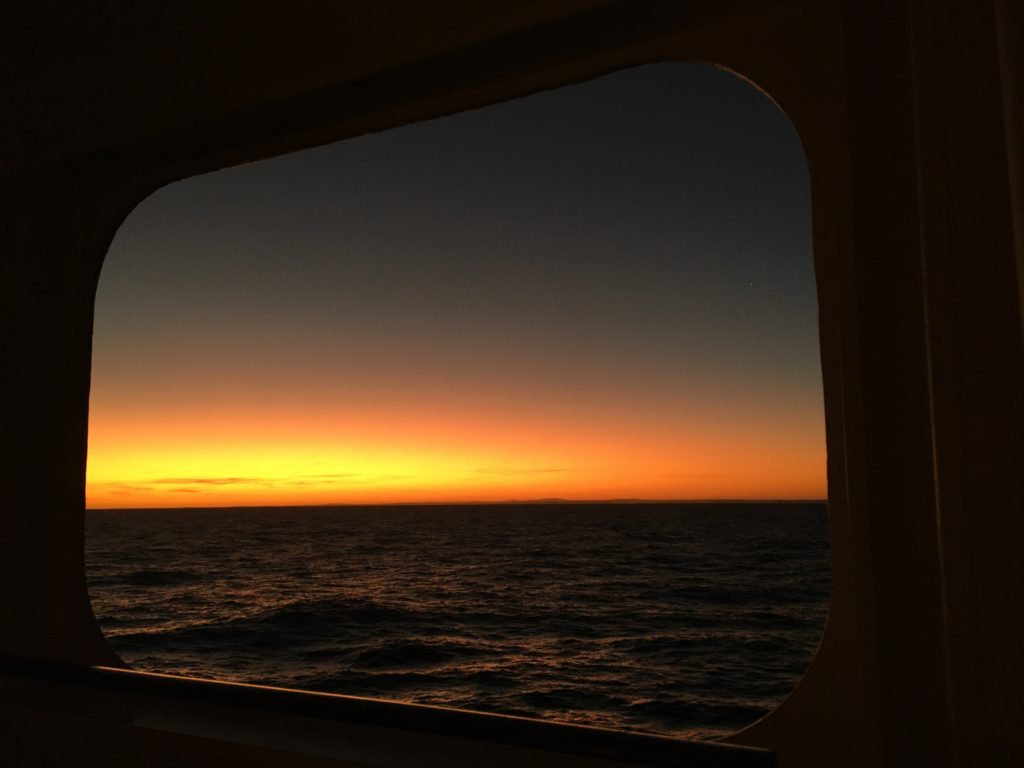
DAY 24 – PORT ELIZABETH
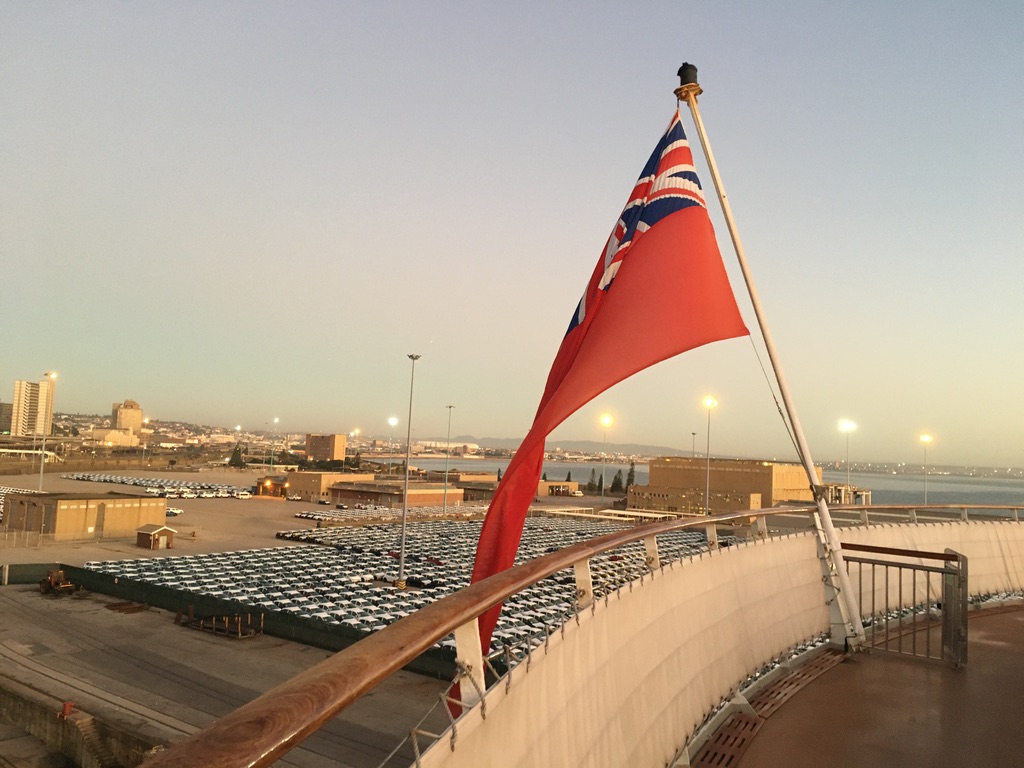
Woke at 05:00, pleasant routine before enjoying breakfast. Supposed to be reading in the theatre at 07:00 but accidently late – no matter – we weren’t called ‘til 07:30.
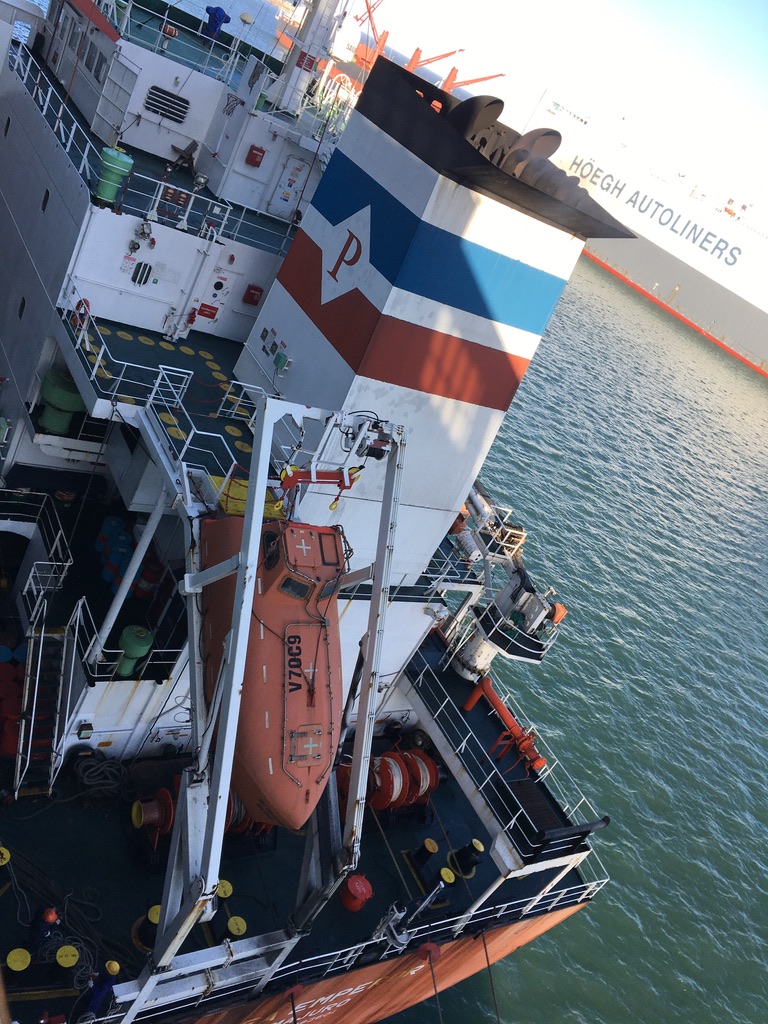
Fifteen of us piled on to a little bus and off we went with guide Siswayle – a smart urbane young man with beautiful leather shoes and cool trousers.
During our drive through grey, littered city streets, into orange farmland, I sat next to Melanie, who turned out to be a mum of a 27-year-old man (snap!), divorced, and having herself a surprise cruise romance. She was trying to remain positive despite her qualms. During our chat, I couldn’t help noticing our bus was lost – more than once. The guide and the driver had several urgent discussions, telephone calls, and changes of direction. I surmised our team had not been to our destination before. The final phone call resulted in our arrival at a walled compound. The wall had electric wire along the top.
Here was Criss-Cross Adventures and we were allowed toilet-time before entering the ‘jeeps’ – and the gates opened into our new riverside experience. I had expected safe nana-rafts, but no, the six canoes on the back of our ‘jeep’ were fully big, two-person, solid canoes. I’d be up a river with a proper paddle. Gulp.
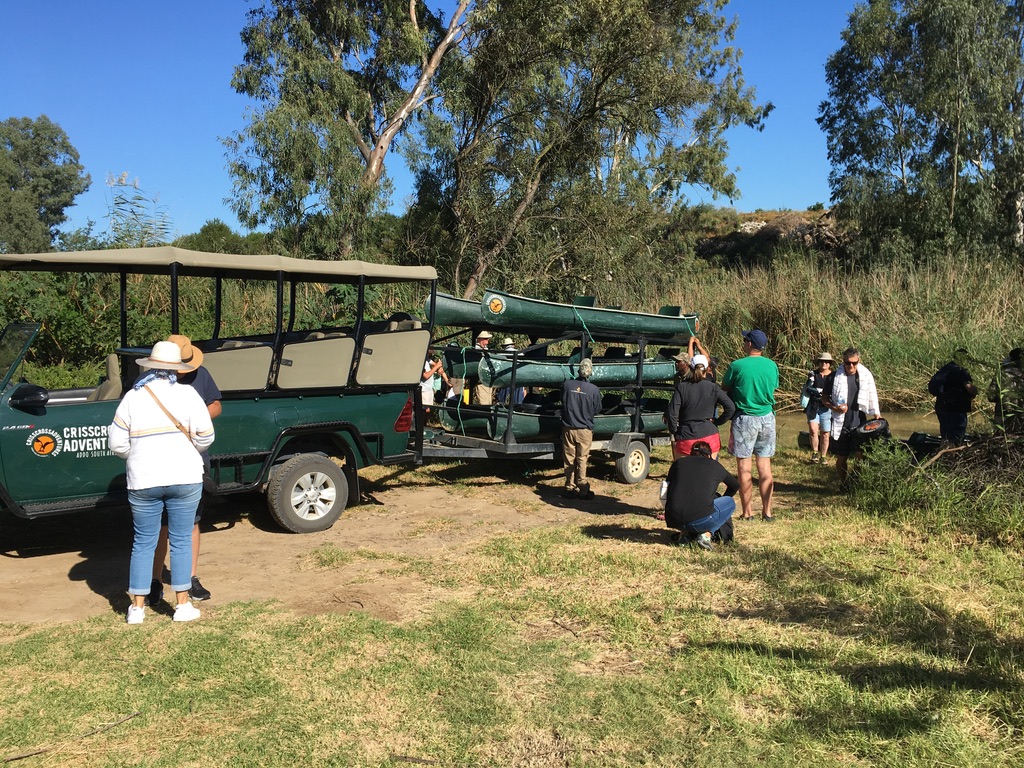
Luckily, as a single, I was able to sit next to the driver, the manager of the business, an intelligent young woman who agreed our bus driver and tour guide had not visited Criss-Cross before. She was frustrated by the system which meant every day she had to guide the guides as well as the tourists. She’d been brought up both in South Africa and England and spoke four languages fluently. Lucky Criss-Cross.
After parking, we watched the three workers manhandle the ships towards the river. I meandered outside cruise control which allowed me to be allotted Andrea, a German tourist not on QM2, for a partner. I don’t speak German and their English wasn’t great, but I saw he and his girlfriend were wearing actual boatie canoe shoes and I understood they were both super experienced. His girlfriend was partnering her friend and there were two others in another boat. So, their party of five got a Reluctant Cruiser as a plus one.
Most of the time the current floated us gently along the khaki-coloured water with Andrea acting as engine while I coasted along gaping at the surroundings. How fantastic, to be in South Africa, on a river, in the fresh air, using muscles. Well, sort of.
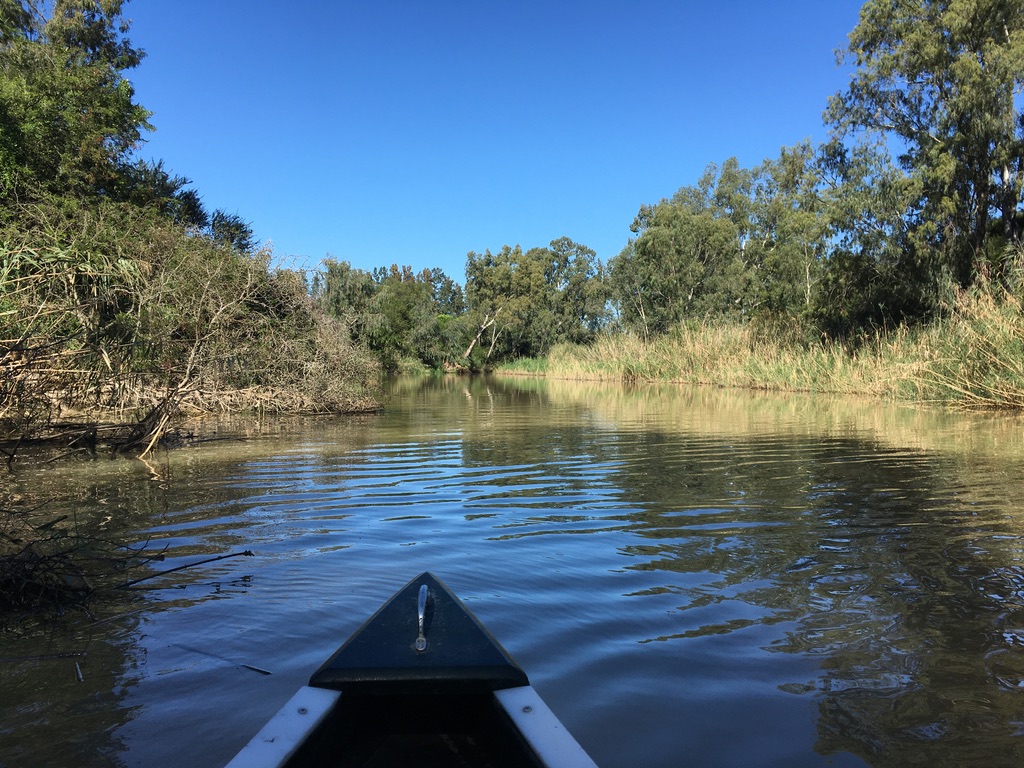
Under a brilliant blue sky, we paddled down the brown, lazy river, looking up at eucalyptus hanging hot above sandy cliffs rising over the rushes and bamboo. Is everything introduced? A good example of the mixing of plants around the world. The guide shouted clear instructions and safety warnings for a couple of reasonable white-water encounters. We took turns to get through tricky bits, calling out that yes, we were safe, before the next vessel started off. Andrea told me to leave it to him, but I suspect it was my cleverly placed and strong paddle strokes that helped us get through unscathed. We got on well, especially after his girlfriend, in another craft, was stung by some wild unnamed South African beast. There were screams and fears of every wild animal, caught in hair and nibbling on soft white tourist flesh. We made our way over the water to the panicked duo, and I applied my best motherly soothing queries to the trouble. As I mentioned, my bag was in their canoe waterproof container, and I encouraged them to open the outside pocket and give me the small white spray bottle they would find therein. STINGOES! As every Australian knows, with one spray, you’re away. Within five minutes the pain and terror had subsided, my bag was reinstated into waterproof container, and I had five new German friends. Who says language is key to communication?
We saw a bee-eater and the most extraordinary Goliath heron, huge, like a brolga, with a massive knife-sharp beak. We saw a malachite kingfisher, lots of African darters, crows, and a magnificent fish eagle. There was a section of the river where weaver birds had created little lantern nests. They dangled from the bank of the river swinging from bamboo stalks as if lighting a parade. The poor male must build, weave, and knit grasses into clever designs to attract a mate. But if she’s not impressed, she nips off the endeavour and it lands on the ground, never to be any baby’s home. All or nothing for the weaver bird.
We were invited to park up and take a break at a twist in the river: juice or beer, snacks and chips, and a good dousing of mud for our shoes as we climbed in and out of the canoes. Back in the boat, with his long legs, Andrea artistically swooshed his little canoe shoes in the water to rinse them as we pottered downstream. This was not an option for my heavier boots and the fact I was cornered in the bow. Back on the land, we waited while the workers loaded up the heavy canoes. This was not a job for a weak person and presumably it would only be possible to do it for a limited time. Our guide admitted that he would be doing a National Park tour that afternoon so perhaps he was transitioning to an easier life.
We were returned to base where everyone rushed to the toilet, then connected with wifi and rang up their families. I said goodbye to my new German friends, asked to scrape off the worst of the mud from my boots, and rejoined cruise life. The next instalment of our shore experience was the Braai – a South African barbecue.
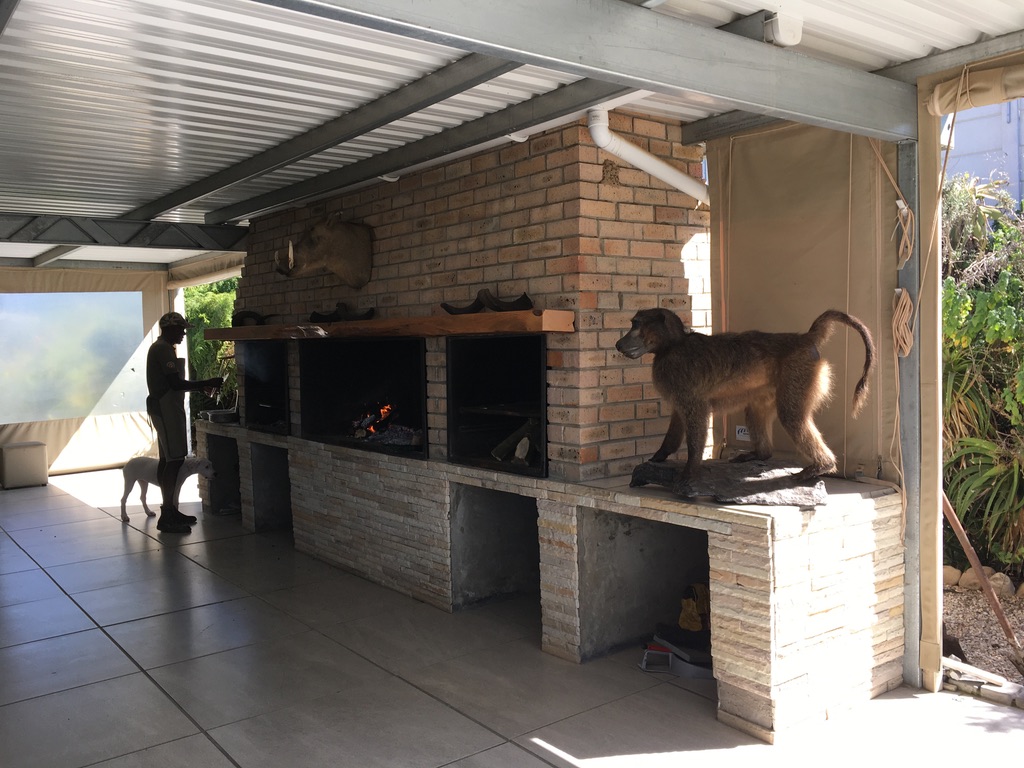
Our busload of hungry cruisers lined up at a long table by a huge fireplace while the drivers and guides prepared our food. I was offered a huge plate of salad and steamed veg while the carnists scored toasted cheese sandwiches and salad, sausages, and IMPALA.
As he gnawed on his impala chunks, fellow cruiser Mark shared information about the ship’s engines gleaned from an article: beyondships.com, Nov 2009. Inside view: “What makes QM2 go? A conversation with QM2 Chief Engineer Brian Watling”, by Richard H. Wagner.
In short, Mark told me, QM2 has four enormous engines in the depths of the ship’s hull using diesel, or heavy oil. Two turbo engines are on the top of the ship, behind the Queen Mary 2 sign, using the equivalent of expensive aviation gas. They’re designed for extra boost power through rough weather or to make up time. Most of the time the ship is running on diesel.
The four Wartsila engines can each burn 3.1 tons of heavy fuel oil per hour at 100 % load. The two General Electric turbos can each burn 6.1 tons of light oil per hour at 100% load. That’s a lot of tons of oil on board. You can read that again.
There are no drive shafts turning propellers, taking up massive space inside the ship. Instead, there are four Rolls Royce Mermaid Pods weighing 260 tons each, suspended under the ship. These tractor units – like propellers but backwards – they pull the ship through the water – are powered by electric engines. Two of these azimuthing pods (azipods), used as rudders, can rotate 360 degrees, which explains the ease of manoeuvring the ship into tight spaces. Two are fixed in position. There are also three bow thrusters that help move the ship sideways.
Electricity is generated by both the diesel and gas turbines. The biggest user of electricity are the azipods but air-co, refrigeration and heating – everything – is distributed by a main switchboard.
I thanked Mark. This information would be invaluable when I found an engineer to (interrogate) talk to – at a cocktail party – or somewhere!
Us cruisers finished our lunch, the workers thanking us even more than we thanked them, and I climbed back onto the bus to hear Melanie’s tale of woe. An experienced canoeist, she had partnered with our smart young tour-guide, Siswayle, a surprise learner. I had noted his beautiful shoes were covered in mud when we’d reconvened. Melanie was able to debrief after her near-death white-water troubles. Siswayle agreed. He had not enjoyed canoeing up the river. He prayed more than he listened to his partner. And his trousers were ruined. Melanie would also need time to recover.
Glossy green leaves of citrus trees contrasted with the orange dirt. Piles of oranges and lemons at the corners of the farms. Pickers at lunch or gone home by the time we’d finished. A warthog ran out in front of us, and the driver barely slowed down enough not to clip it. The poor thing ran in front of us for 100m or so and finally decided to swerve for the verge. No roadkill in evidence, unlike Kangaroo Island.
Many people hitchhiking, the public transport unpredictable at best and non-existent the rest of the time. Some folk didn’t bother looking both ways, taking their lives in their hands and striding across the road. As with the warthog, the driver barely slowed but we all survived.
On the way back to the port, us cruisers fell silent as we drove through the townships. Siswayle explained they normally avoid that route because there are often protests, burning piles of tyres and throwing bricks. But today everyone was calm and, in his words, minding their own business.
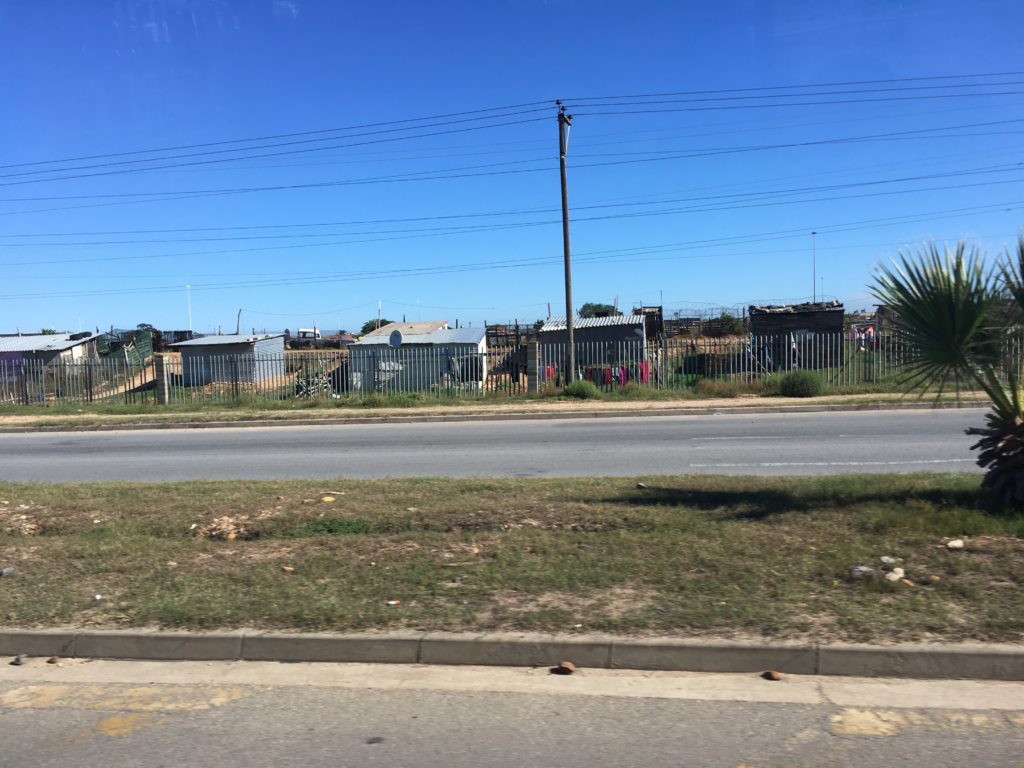

Dramatic contrast between rich and poor areas – Siswayle called the poorer suburb, ‘Get up and Go’ or ‘Move Up’, perhaps rephrased as start small and succeed. He used to live in these shanty towns and, as he grew up, moved to the cleaner, tidy suburbs. We passed his old school and wondered at his determination and the power of prayer. He would have to buy new shoes.
Survival as seen from the windows of a tour bus.
Then there were cars, manufactured here in South Africa and positioned to load into car transport ships.
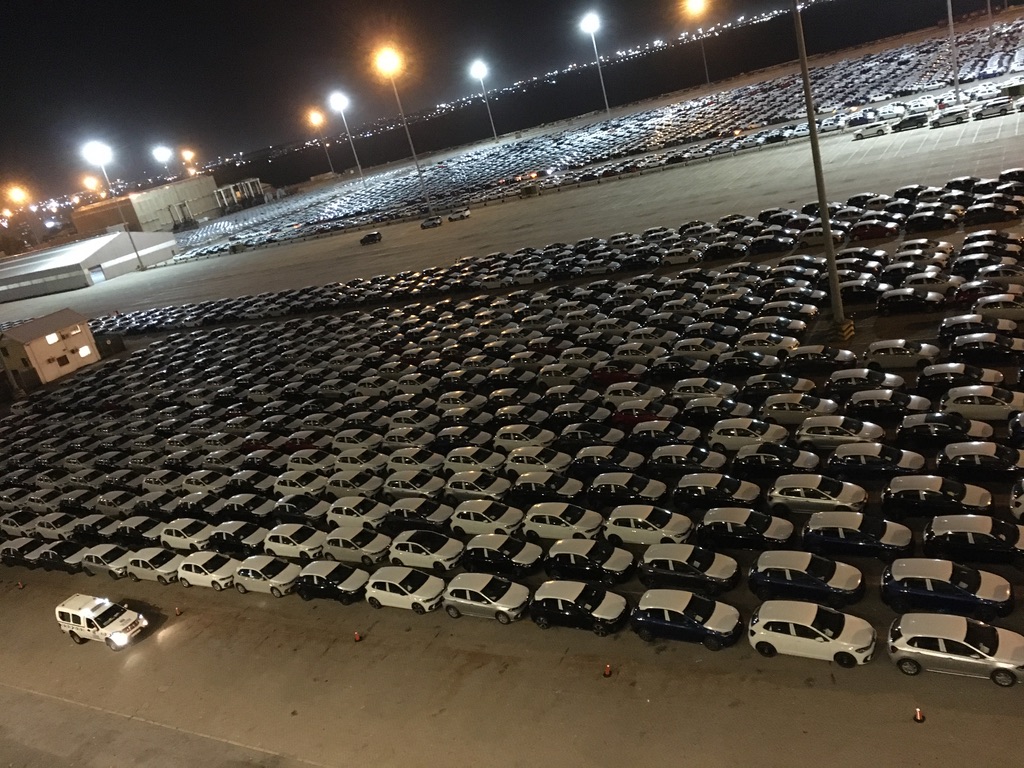
Full moon already? Couldn’t it wait for Easter?
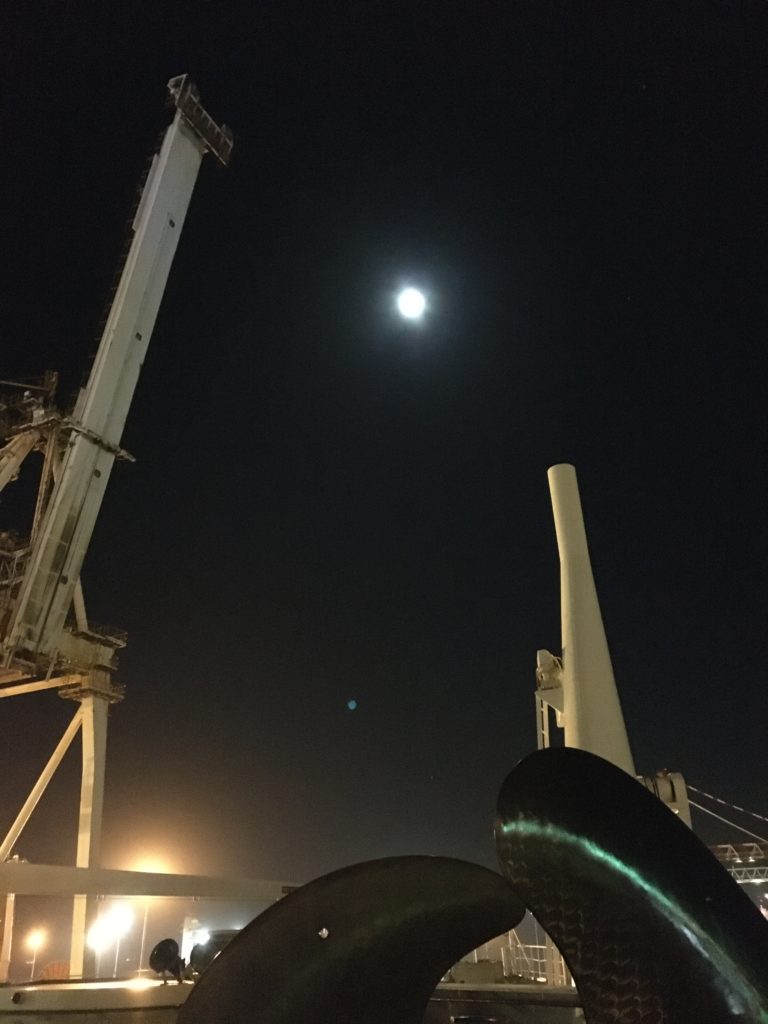
DAY 25 – at sea – passing Cape Aghulas, the most southerly point of the continent of Africa.
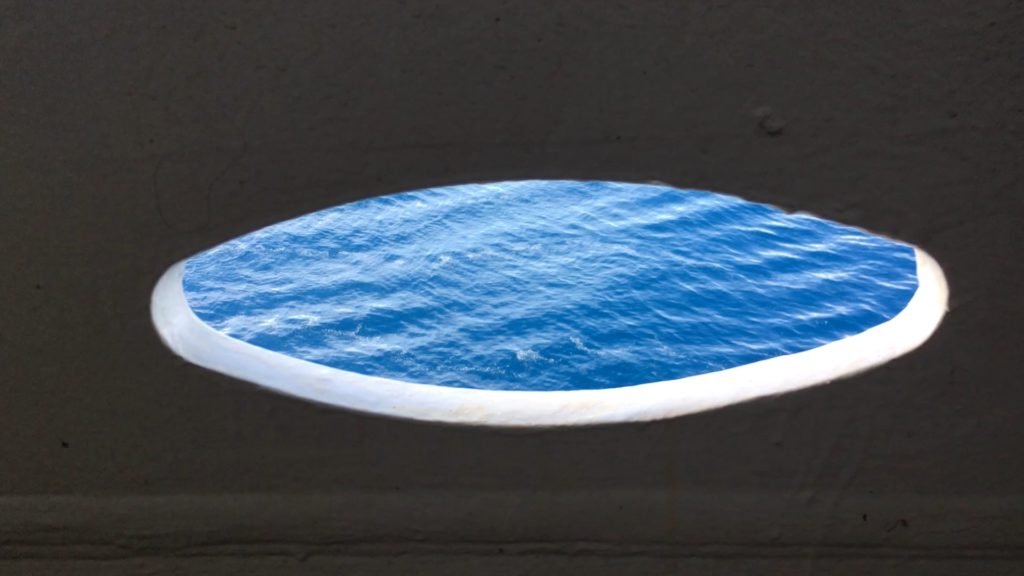
Met Jane at the bow deck. We watched a trio of white birds suspected of being gannets. When one flew sideways, she named it a Cape Gannet with the aid of her trusty bird ID app. She’d been initially undecided as they looked small, and she’d thought perhaps shearwaters or petrel.
The library has no book on seabirds – not even a poster – and it wouldn’t really matter because of the dearth of wildlife so far.
Sir Bob Geldorf is offered up as enrichment for the ‘guests’. He appeared in the Royal Court Theatre clad in a crumpled white suit, lounging louche low in his chair. His talk was livestreamed to the cinema next door and to the internal tv system. I chose to skip art class and watch the speech from the comfort of my own cabin. I was impressed by Neil, the Entertainment Director’s interview skills. He welcomed the knight, asked him ‘How did it all begin?’ and sat back to let the great man answer, only coming in at the end to admonish the speaker’s spicy language.
Sir Bob spoke with eloquence, learning and prescience. He feels the problems of the world: climate change, nuclear proliferation, economy, are global. Current UK and USA leaders are nationalistic, and, amongst his other aims, Putin is trying to destabilise the EU.
Sir Bob admitted to being a pattern-seeker, and feels we are on the brink of some great thing. He noted the build-up to WW1 began with new technology leading to a new economy and the old guard resisting. He pointed out WW2 only finished when the Berlin wall came down and the internet was invented. Now there’s a new global economy and the old guard is resisting strongly. Change is coming. What will it be? How will your grandchildren survive? Can they?
His advice to cruisers was to put the news away, talk to children and try to avoid shouting at each other. He shook his hairy grey tired head and said,
‘Just be kind.’
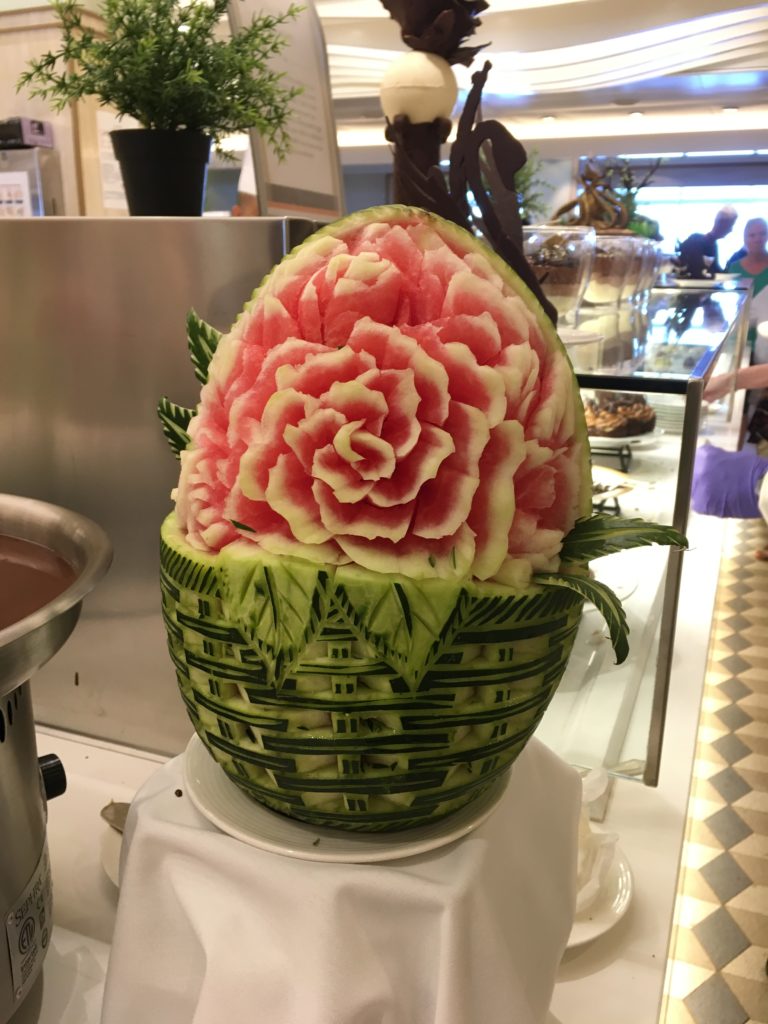
DAY 26 – CAPE TOWN
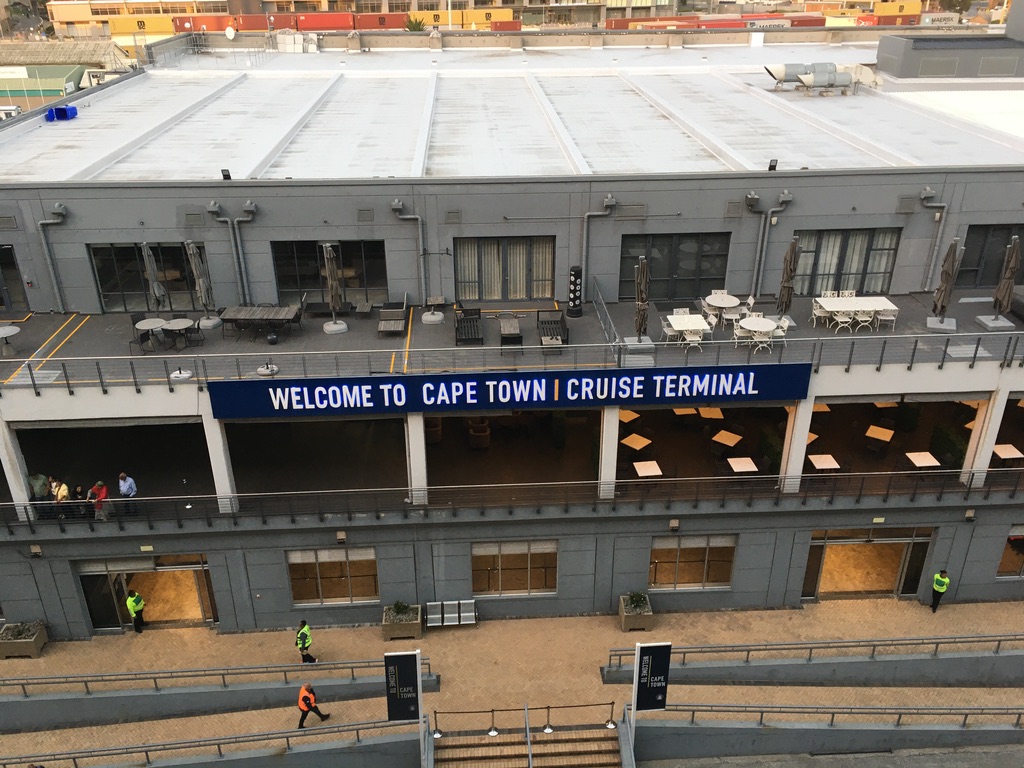
Today we were to visit the city: The Fort, The Company Garden and Signal Hill.
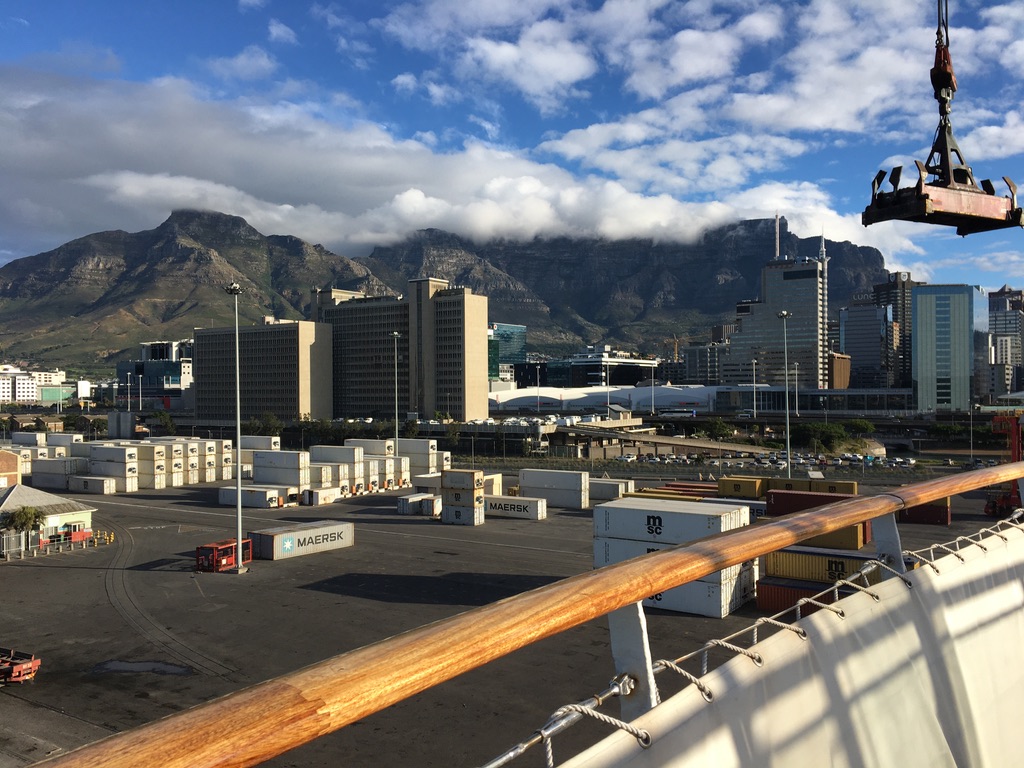
It was rainy and our guide was strict and stressed. Kaaaren loved to count. Unfortunately for her, this group of cruisers preferred to look at things like adults and didn’t like to be counted. A group of elegant ladies up the back of the bus began to giggle early on and eventually reverted to sixteen-year-olds running away from the big, bad teacher. We would have preferred Kaaaren to count us at the beginning and end of the excursion and not during. She liked to gather the group together and count whenever she could, and her strategy failed early leading her to further stress. As we approached, she thought the Fort was shut, but some of the naughty girls had run on ahead, returning to report that it was in fact open, so Kaaaren had to get marching and do some organising. She found a young guide who could recite his lessons very fast with some panache.
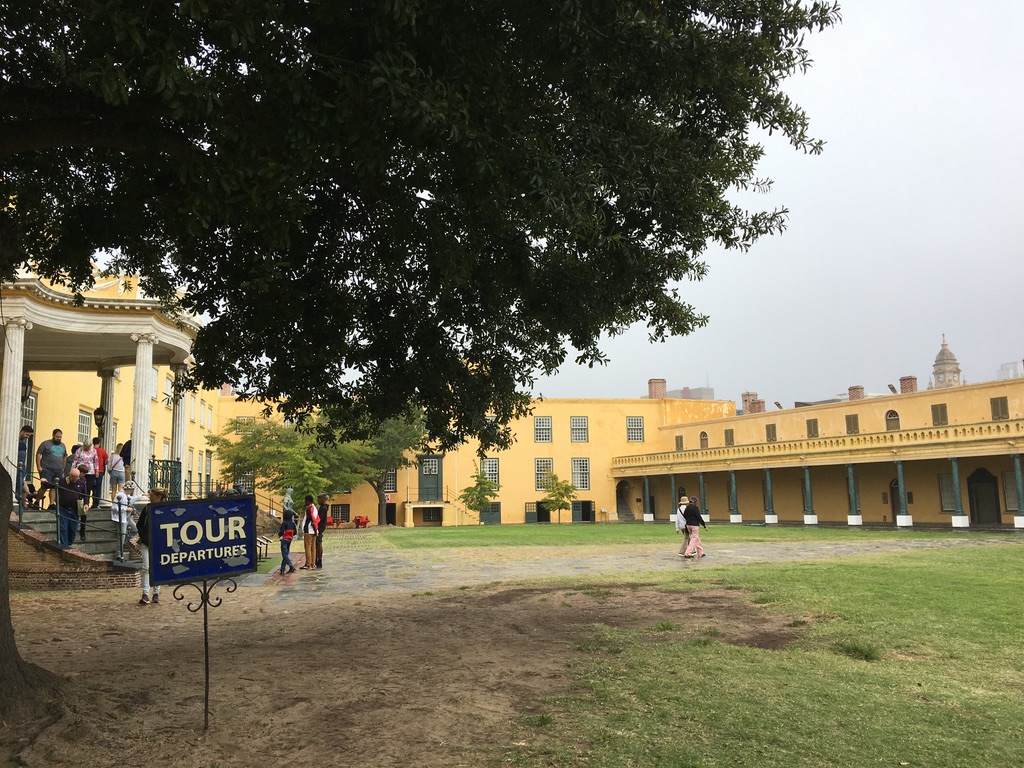
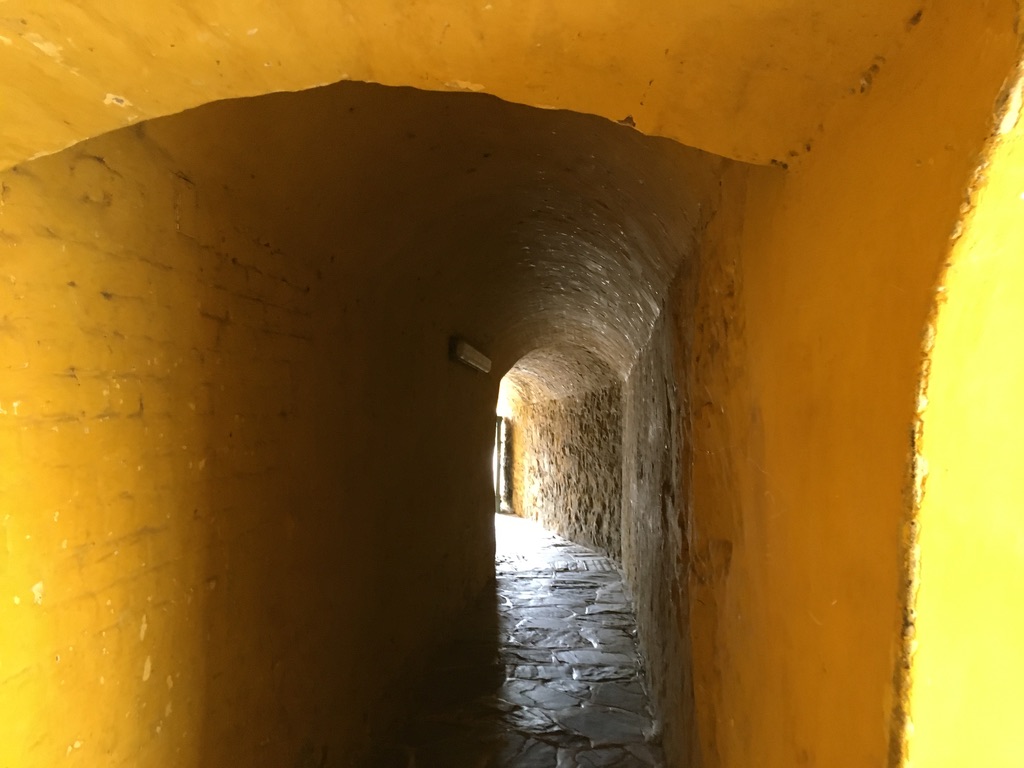
It was a typical military place, with grounds and pleasantly furnished buildings for officers and less comfortable spaces for soldiers, and even a torture chamber for naughty people with a cat o nine tails. Not even that threat could stop our well-dressed ladies sniggering.
Kaaren invited our busload to walk through the oldest garden in South Africa, the Company Gardens, with her in the light drizzle but also pointed out the museum and the gallery. Given the inclement conditions I chose the South African National Art Gallery and loved the mashup of old and new. I found some of the work, and some of the juxtapositions inspiring, passionate, and provocative.
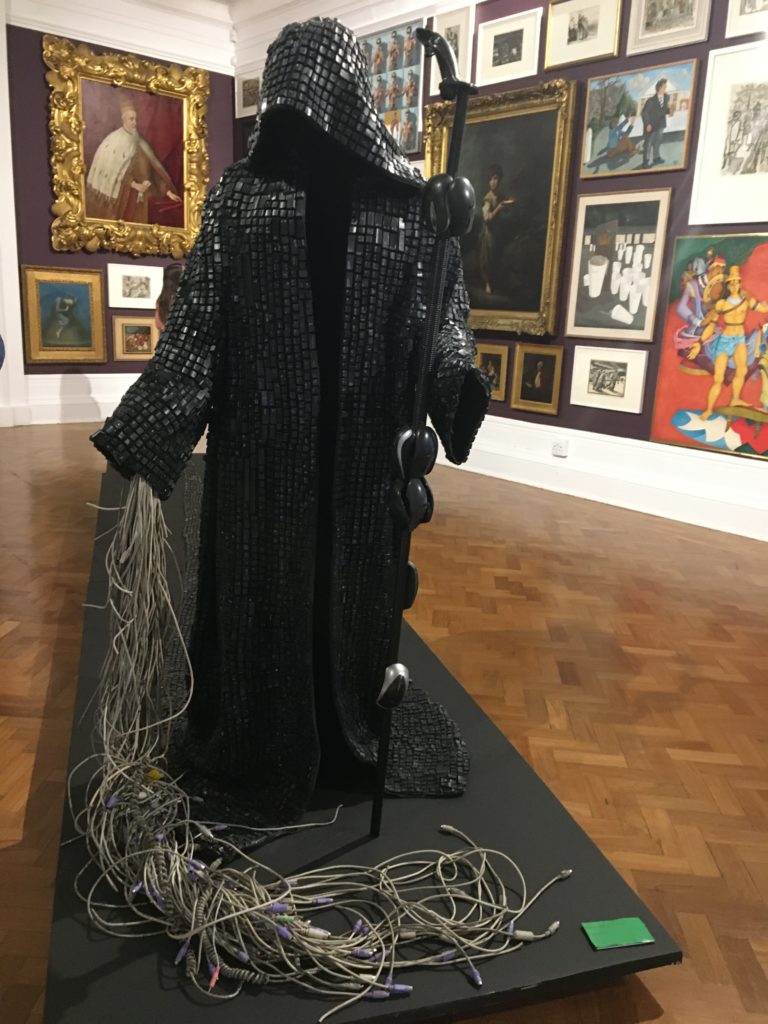

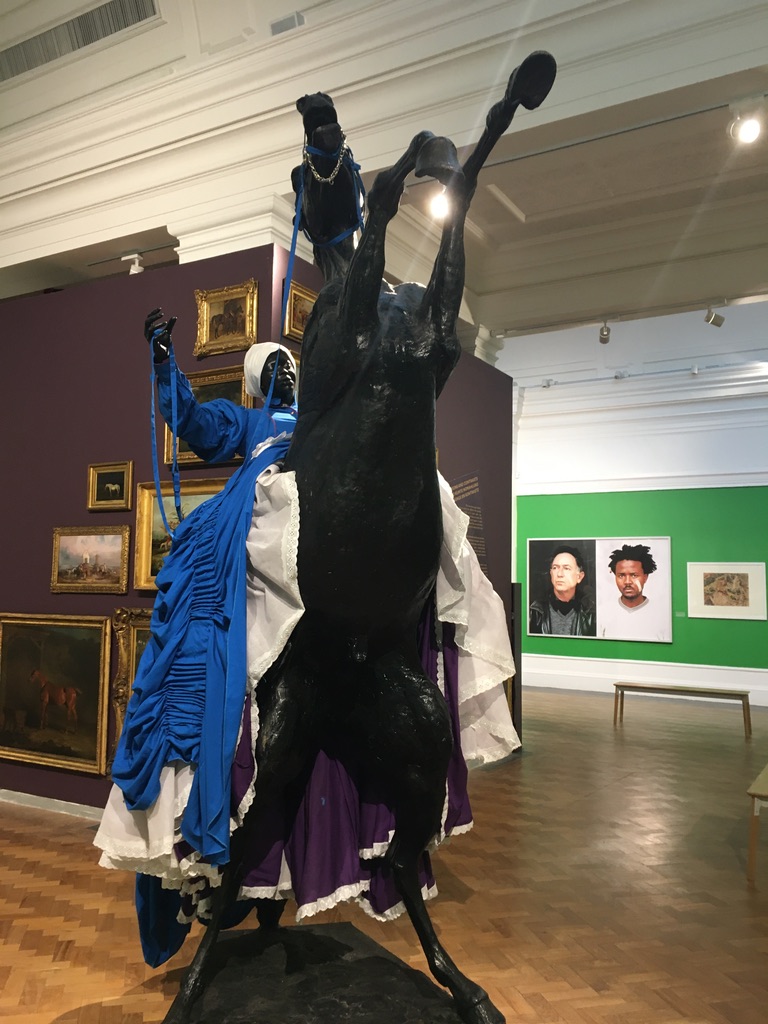
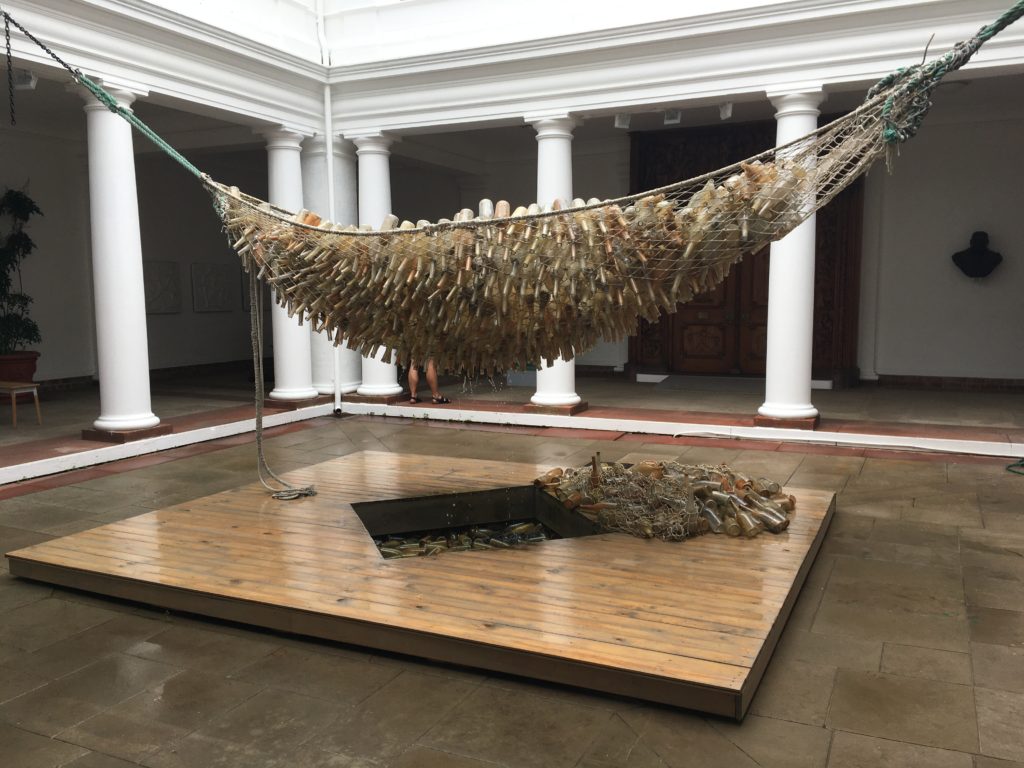
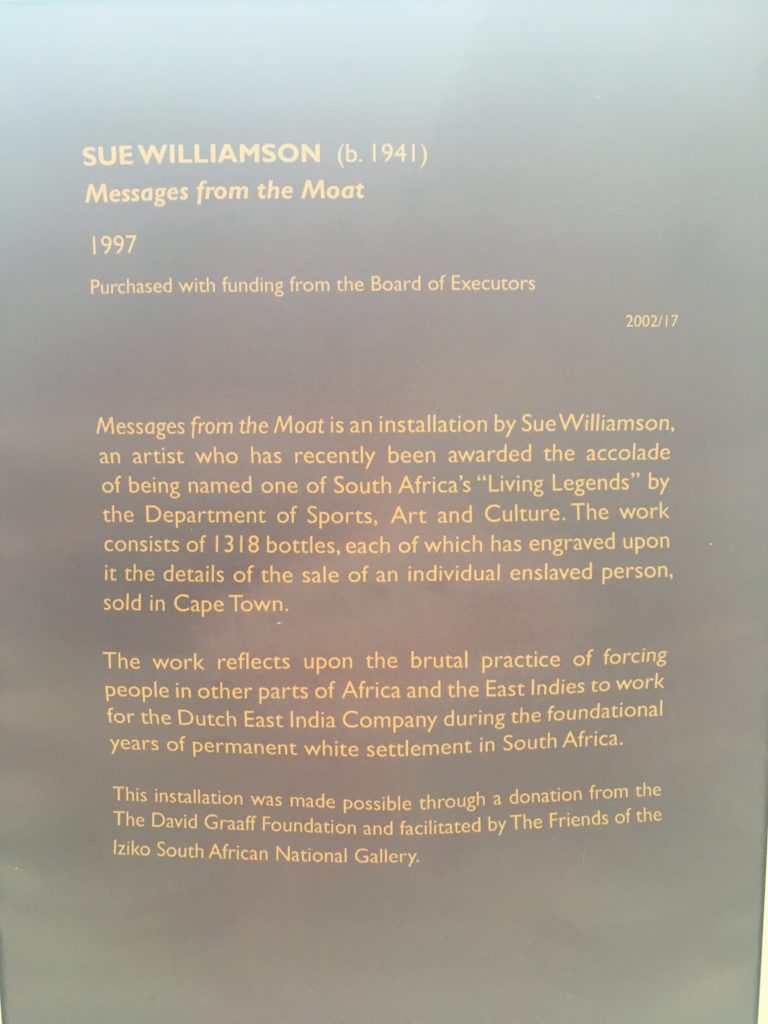

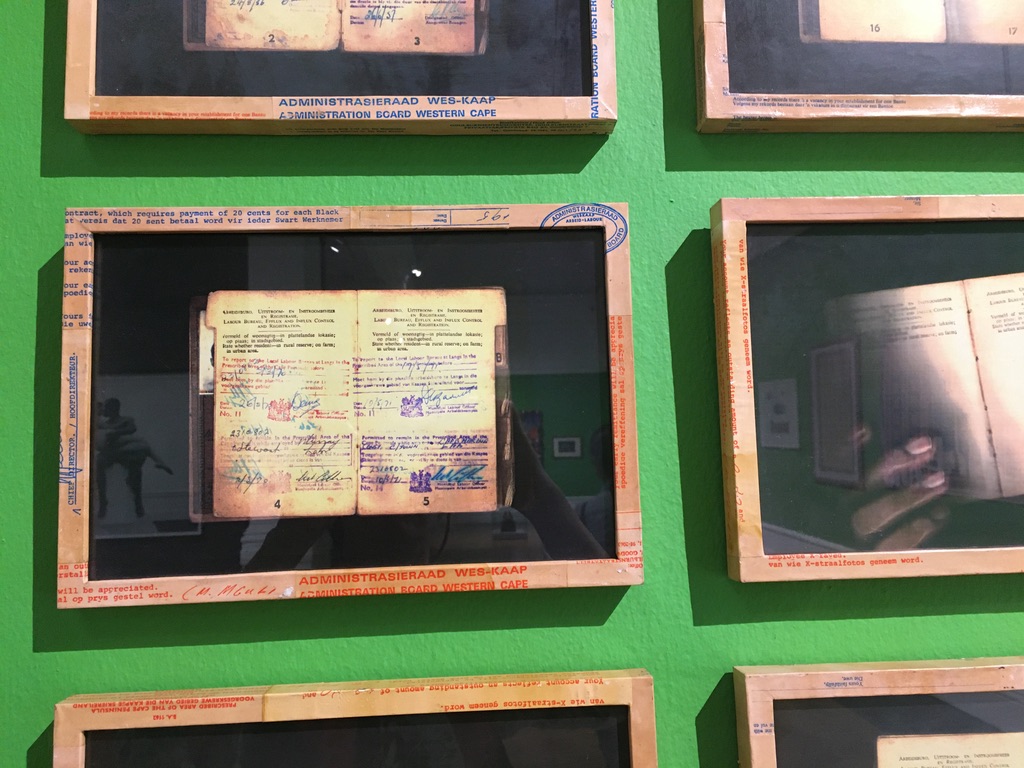
Due to the rain and mist Signal Hill had limited sightseeing opportunities, like to about three metres. Kaaren would have liked us to stay on the bus and get counted, but the gang piled out and milled around regardless. She only began to relax when she realised she’d not lost anyone and it was time to go home.
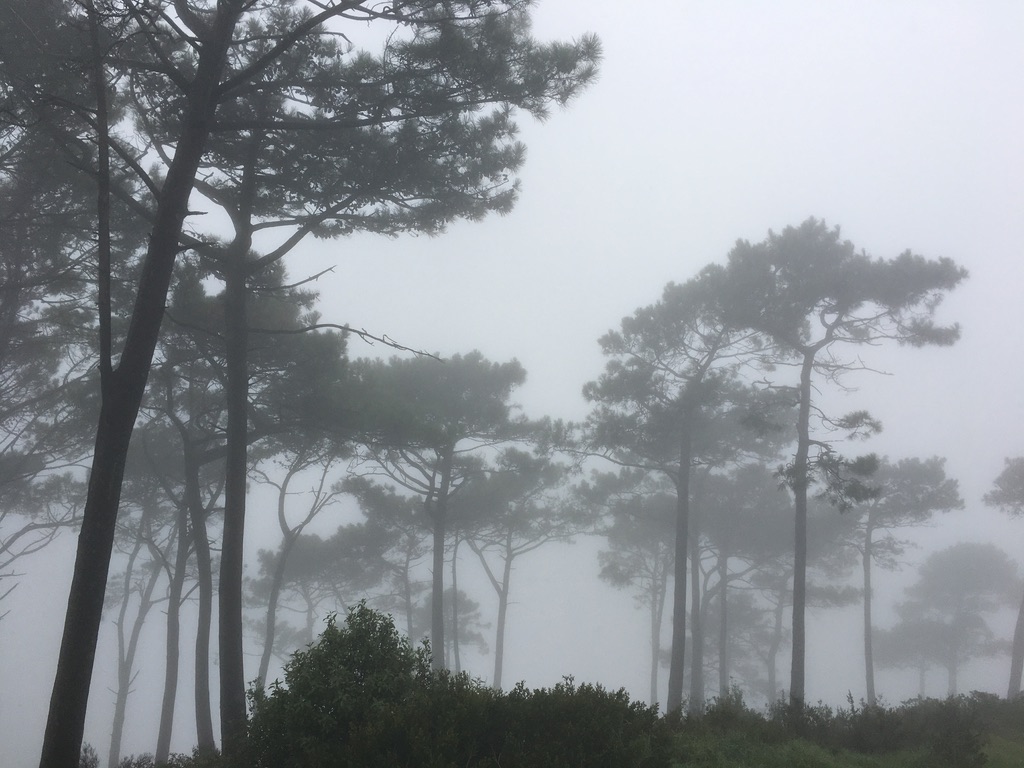
Two of our 680dotcom team, Andrew and Ray, endured their own thwarted bus tour due to the mist. They drove all the way up Table Mountain and could see nothing. Apparently the cloud is common and known as The Table Cloth. On their return to the bus, their guided counted, recounted and and recounted in vain. Someone was AWOL. Due to the clash of the numbers, they waited for the missing person to return. And waited. Had the person become lost? Fallen off the Table? There was no return and it took an hour of waiting before they were informed the missing person had returned to ship on another bus.
I suppose the paper ticket system has been going for years but, as all the information is on electronic record, it should be a simple matter for each guide to have an ipad with a list of their class. Why, it could even include notes about naughty children!
On our return to ship, I jumped straight on the shuttle bus to a big waterside shopping centre near the port. It was a mall offering all sorts of restaurants, supermarkets, and specialty shops but no postoffice. Given it was Easter holidays it was packed. Found lots of snacks.
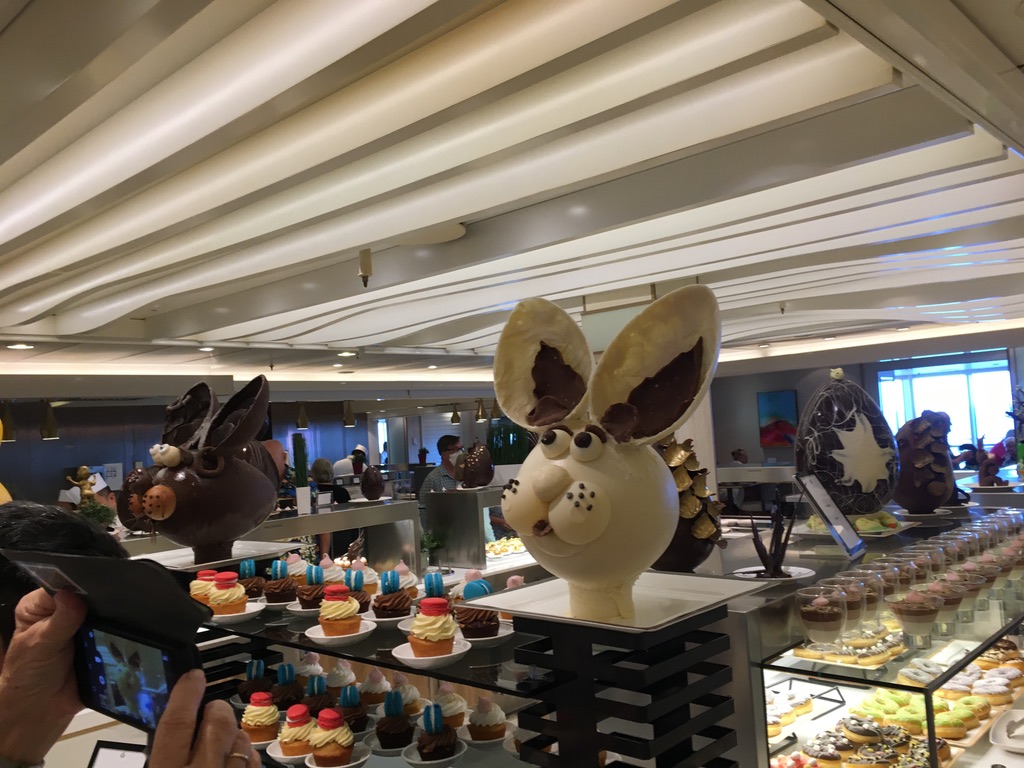
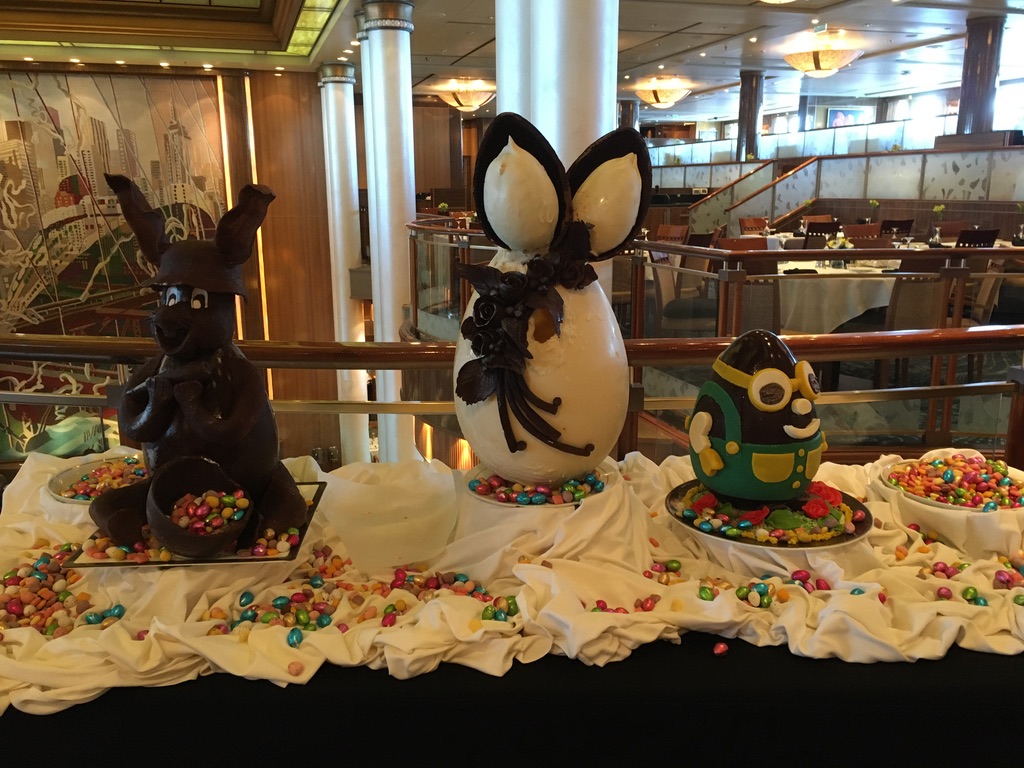
In food notes: speaking with Richard, our Head Waiter, I mentioned my minor disappointment I would miss a hotcross bun as they contained cow and egg wash. He said he would place a special order for me. When would I like it? I didn’t like to be a trouble. He said, nonsense. Would I like it tomorrow? On consideration, given I was only having the one, I felt I should abide by tradition and said the Sunday breakfast would be ideal. He was only too happy to organise it for Ms Osborne, the only vegan in the village. (He didn’t say that.)
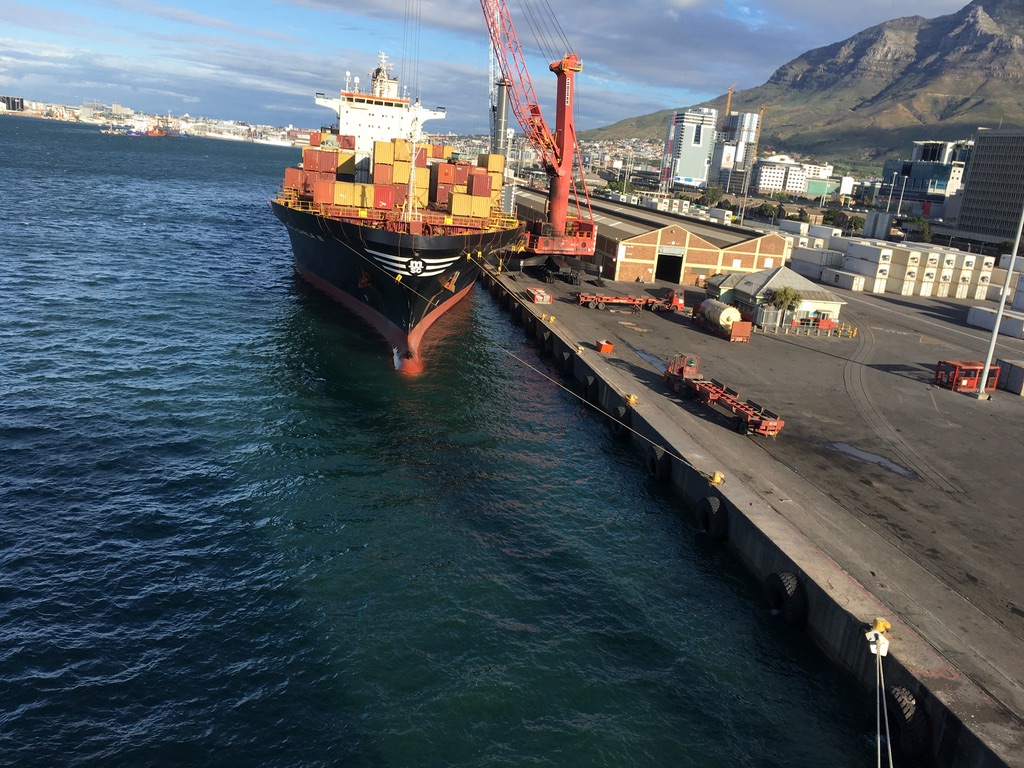
DAY 27 – CAPE TOWN
Major excursion day to Cape Point. And the Cape of Good Hope. And MORE!
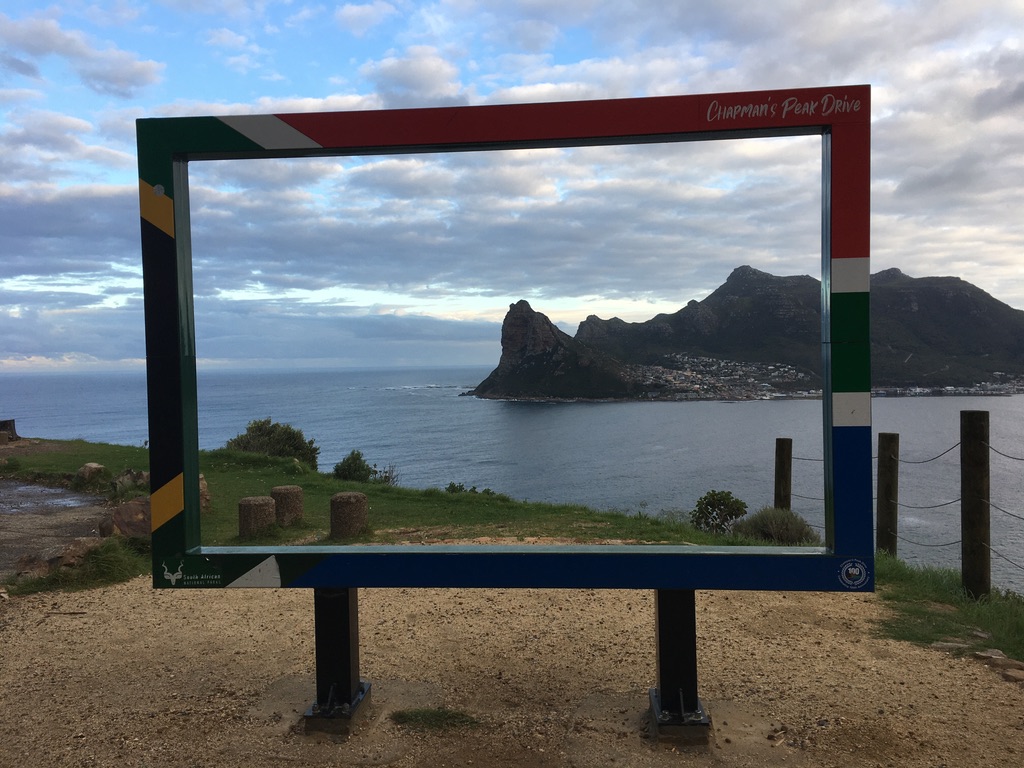
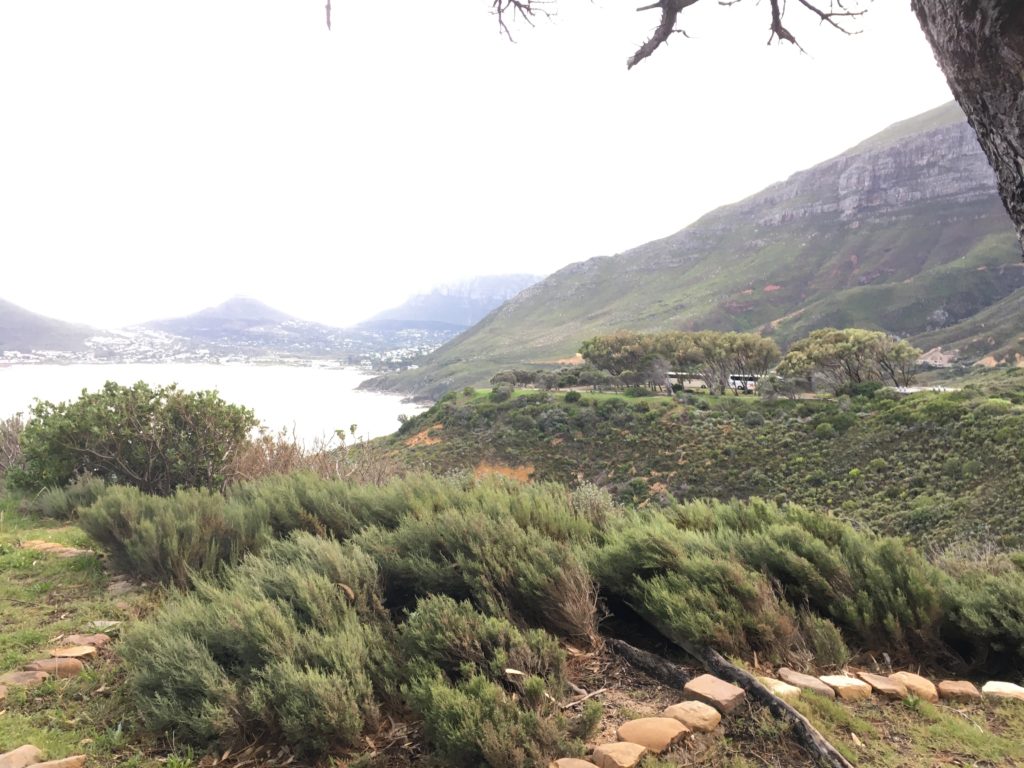
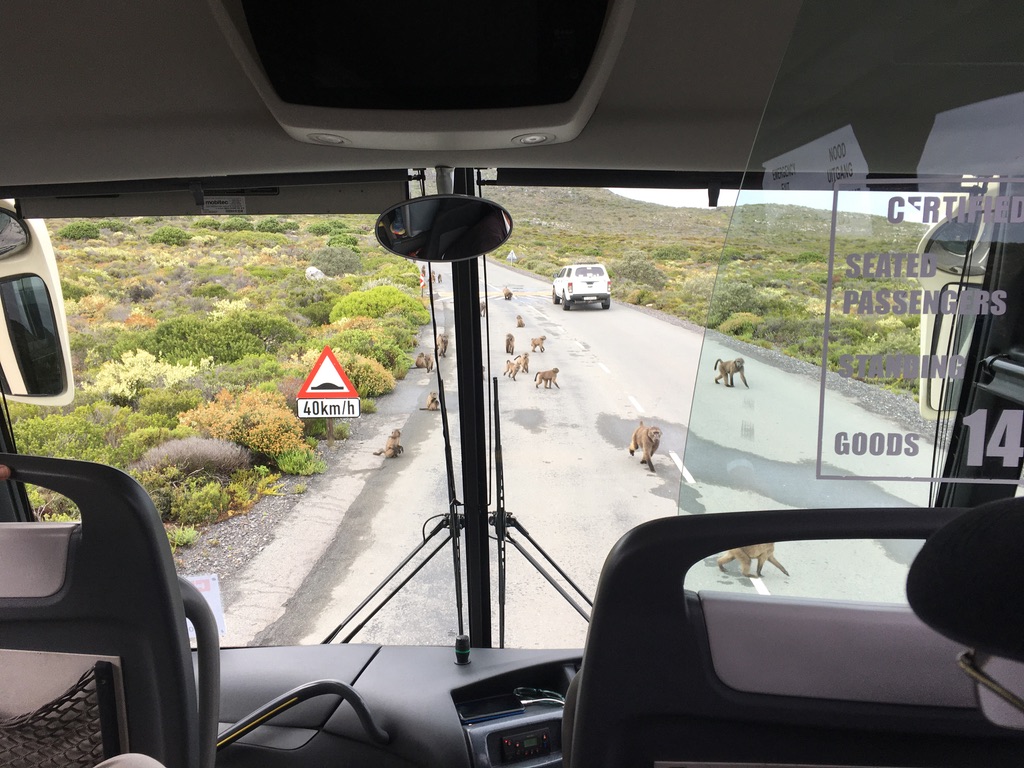
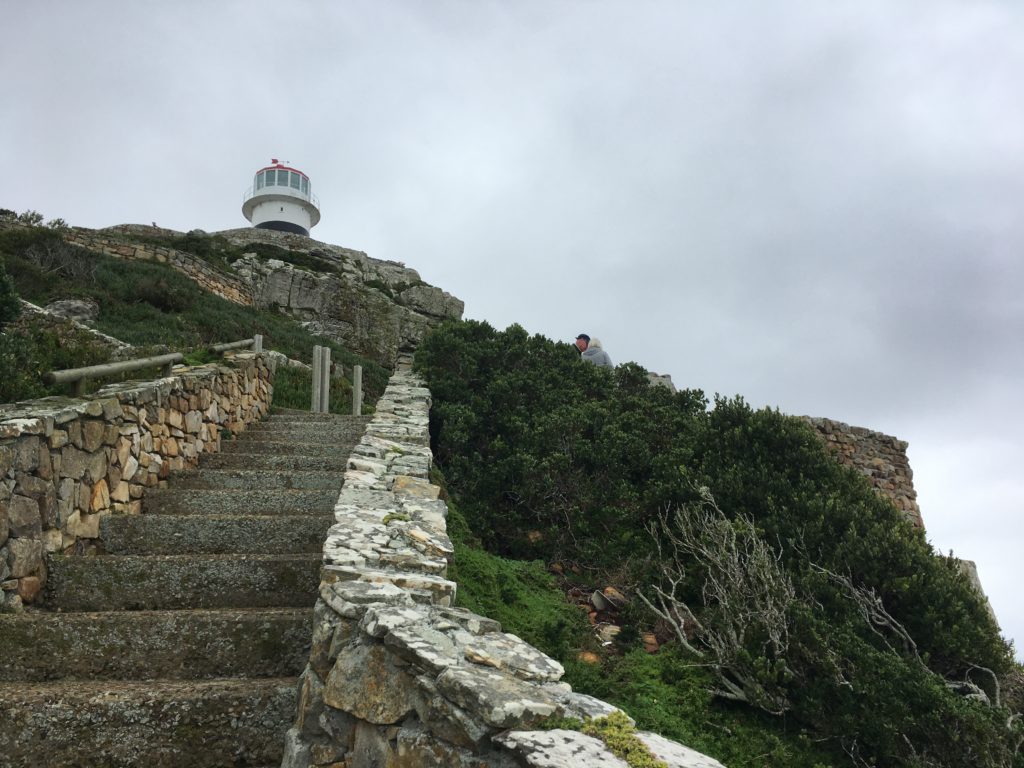

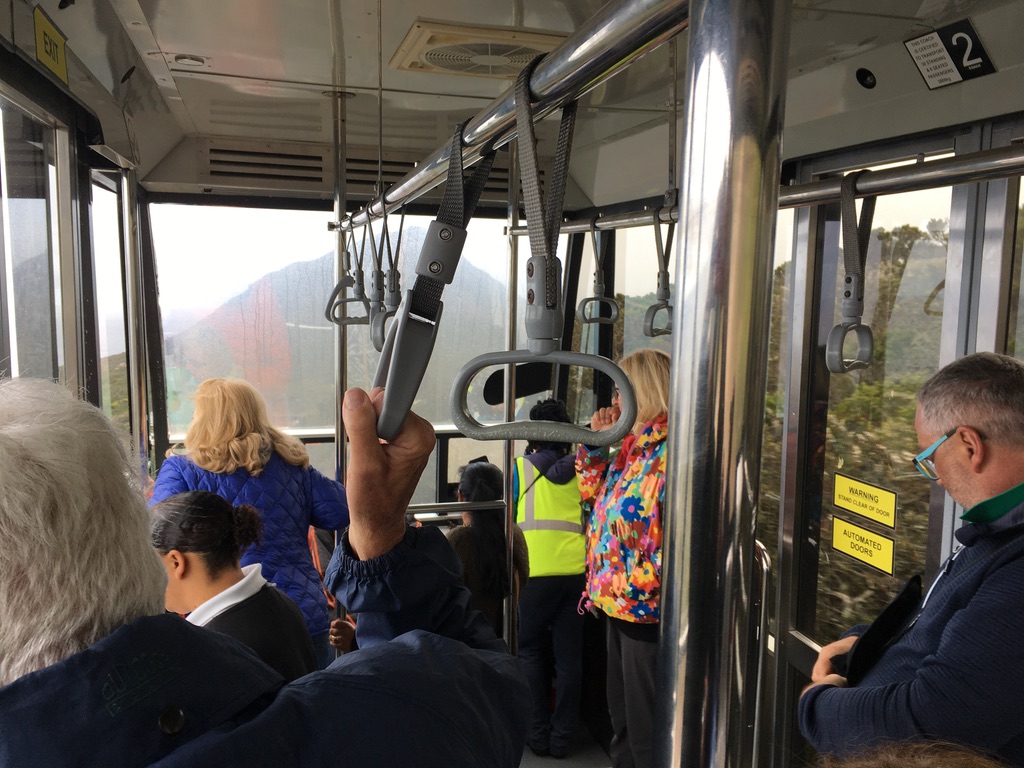
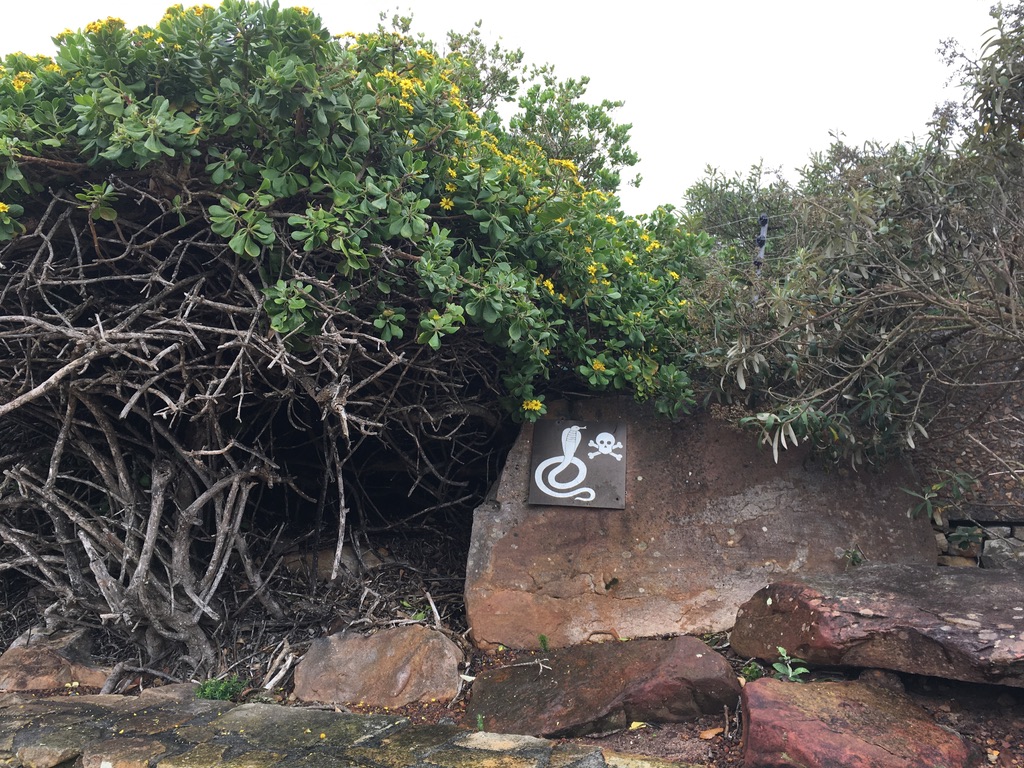
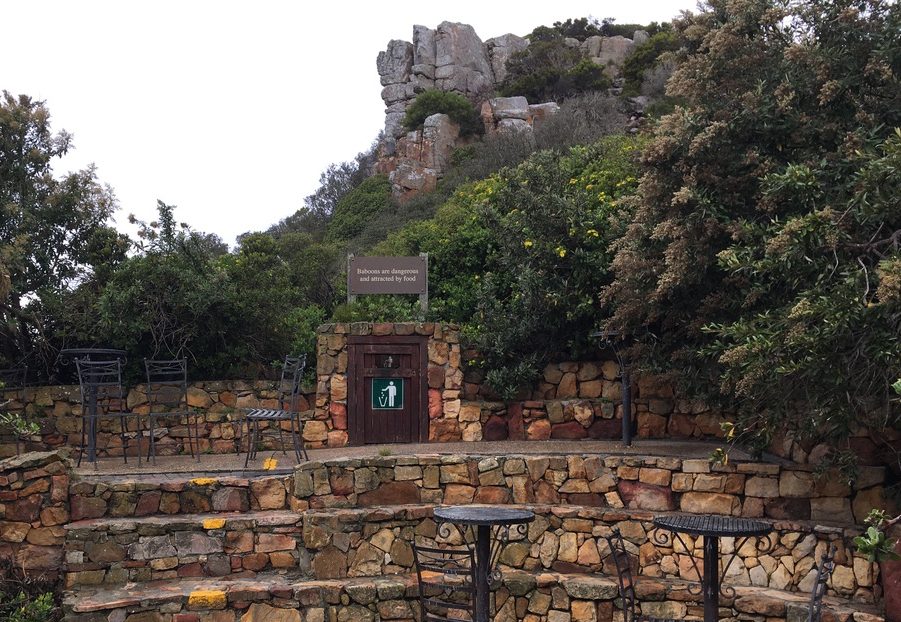
Warning. The Cape of Good Hope does not have a lighthouse or tourist facilities. It’s just a car park and a rocky outcrop.
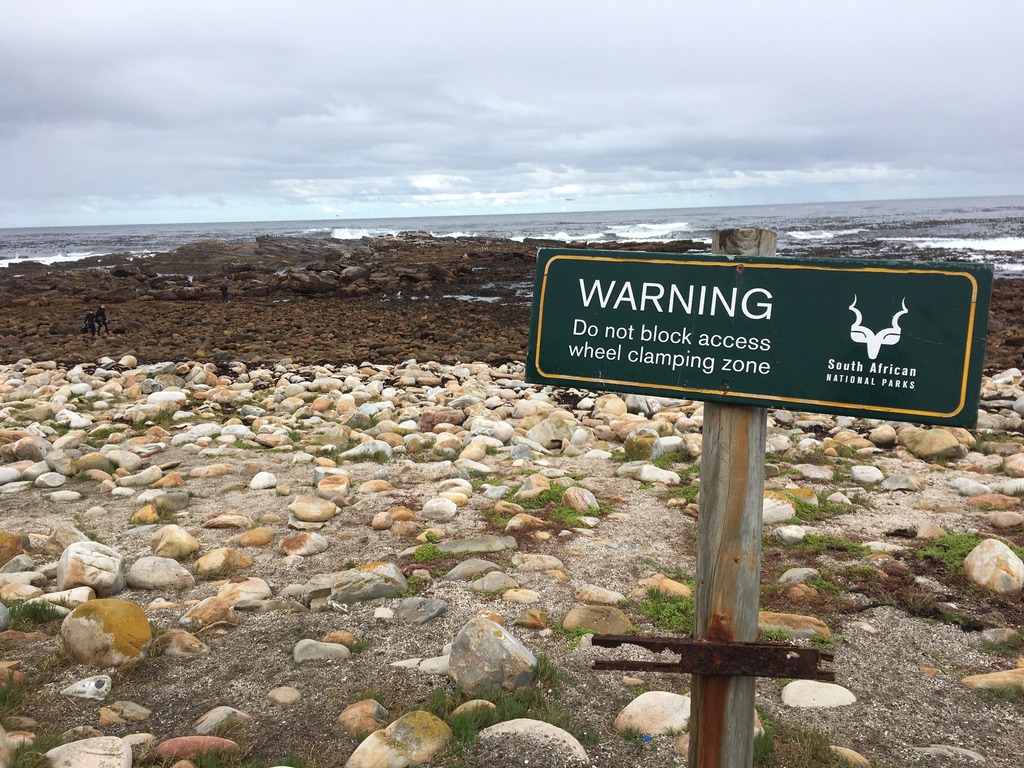
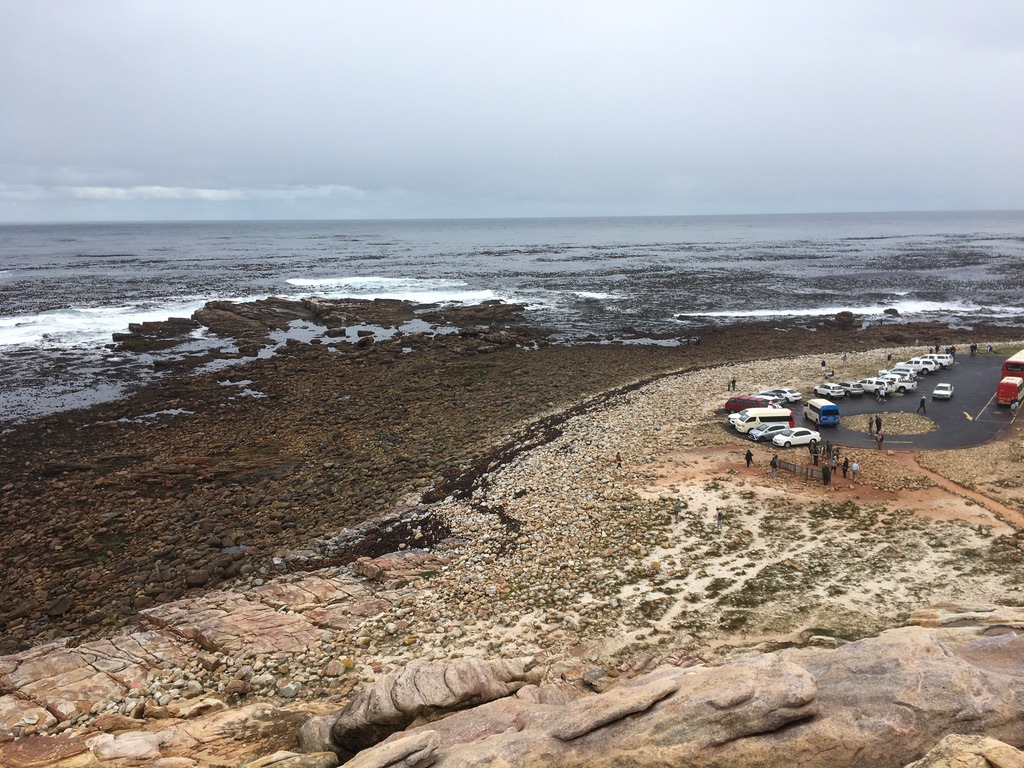
All in all, it was a pleasant, traditional bus tour with entertaining guide PLUS a fantastic meal overlooking the water. Tofu ‘fish’ slabs with chips and salad. A berry fruit salad that made all the bored ice-cream eating carnists sit up and pay attention. They began to look around and cry out that indeed, they were vegan too! Too late, flesh munchers!
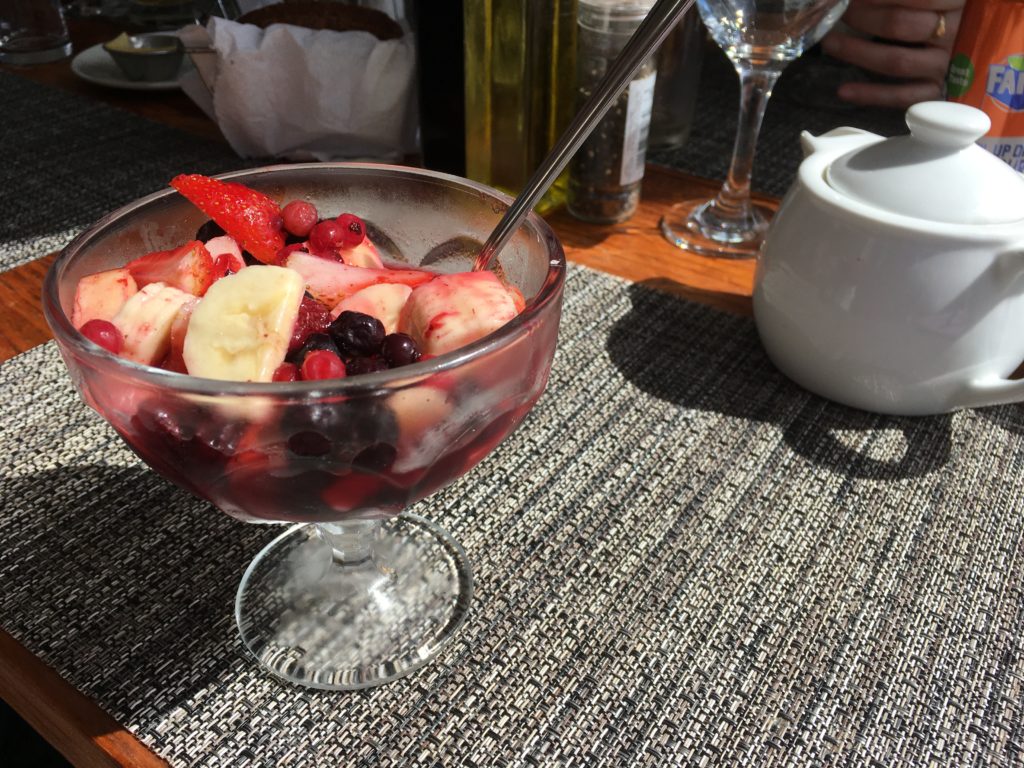
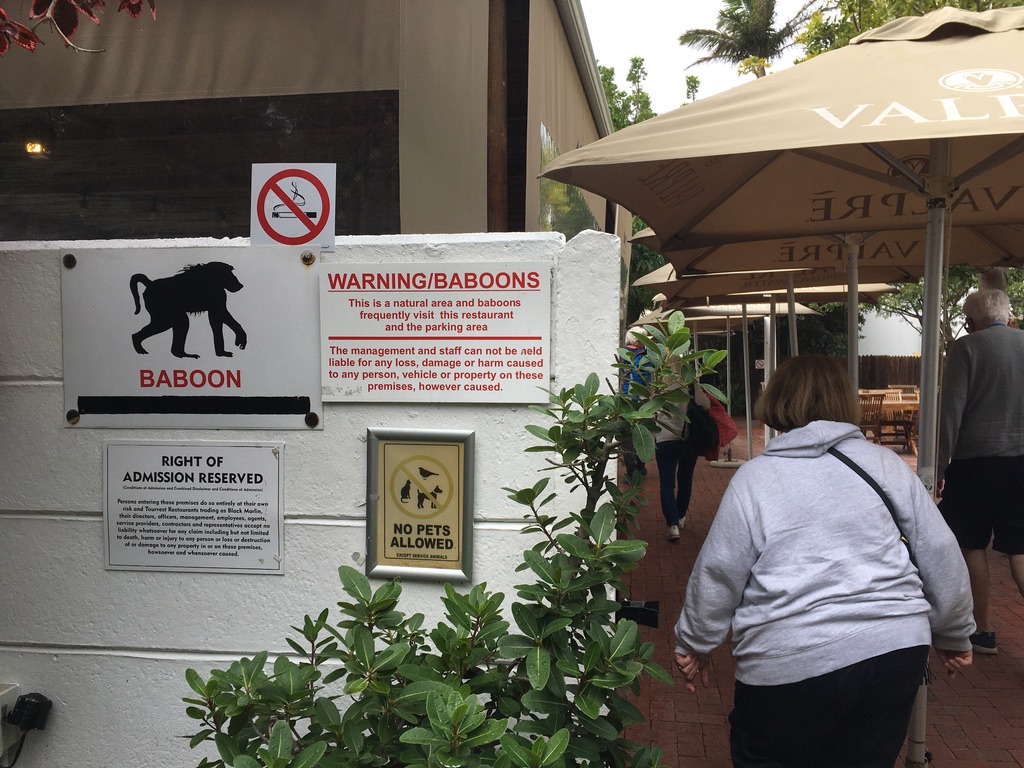
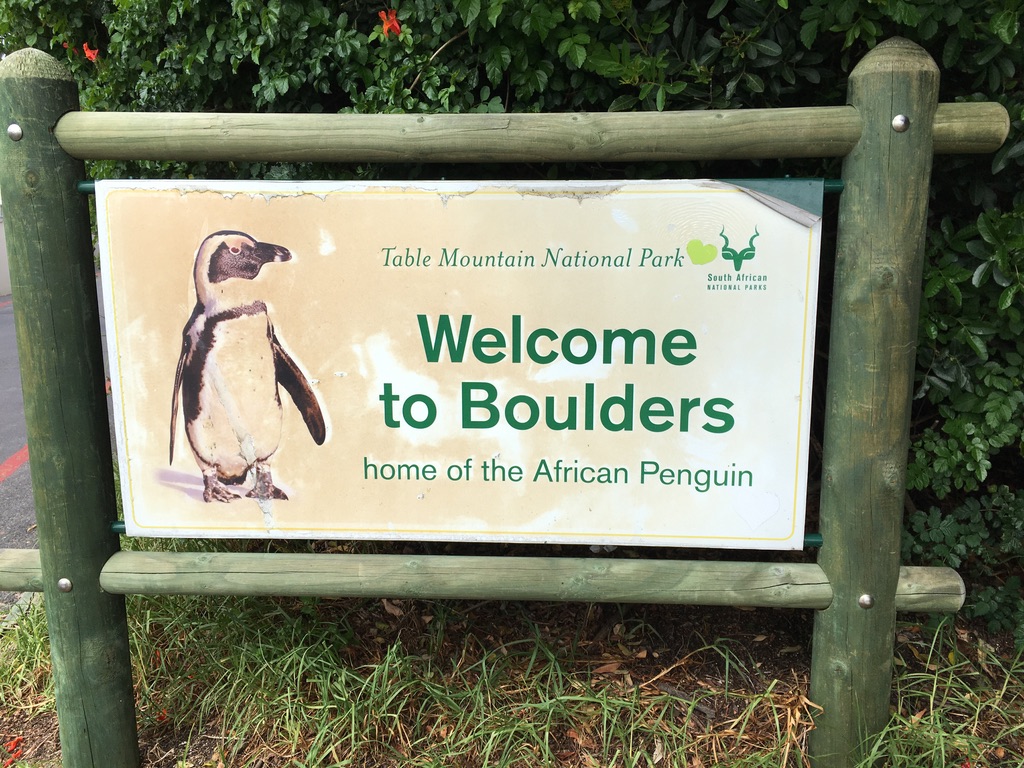
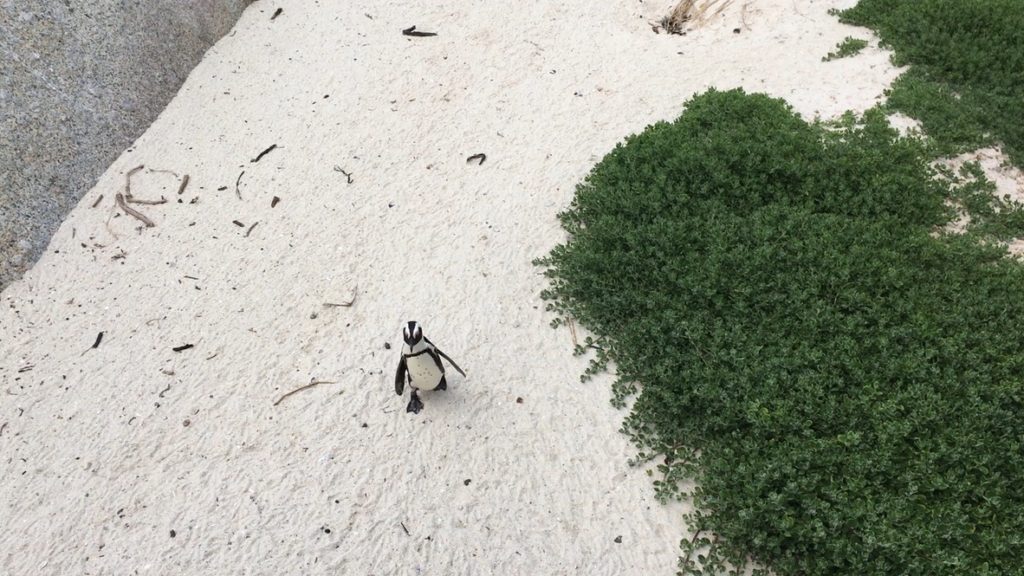
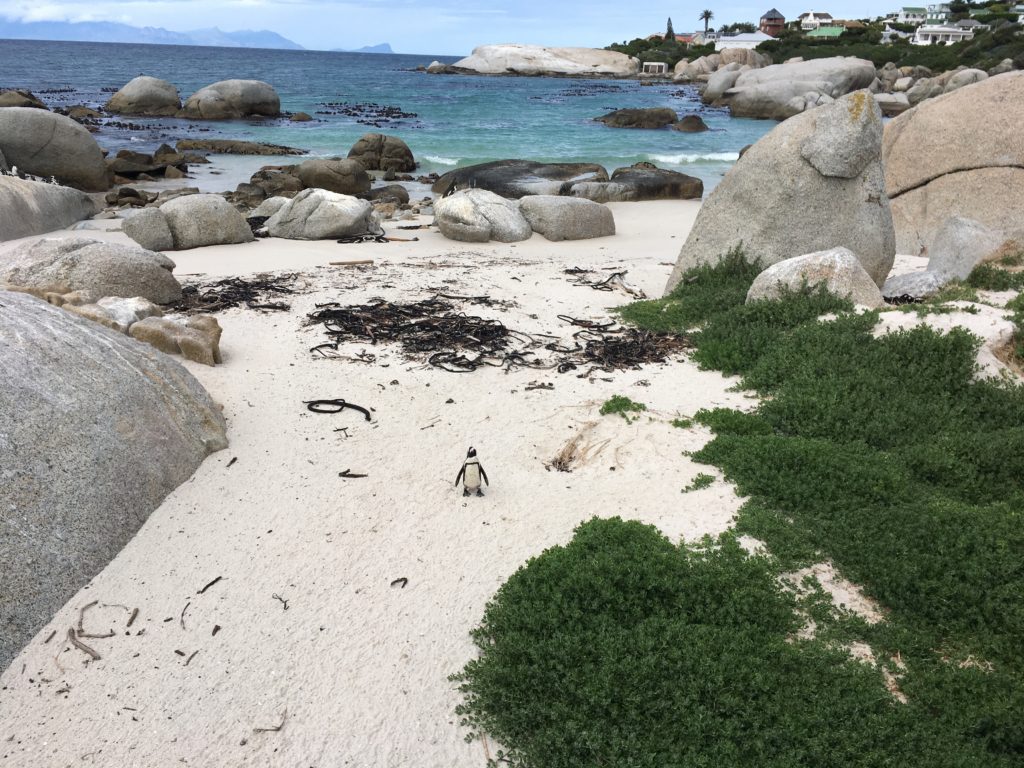

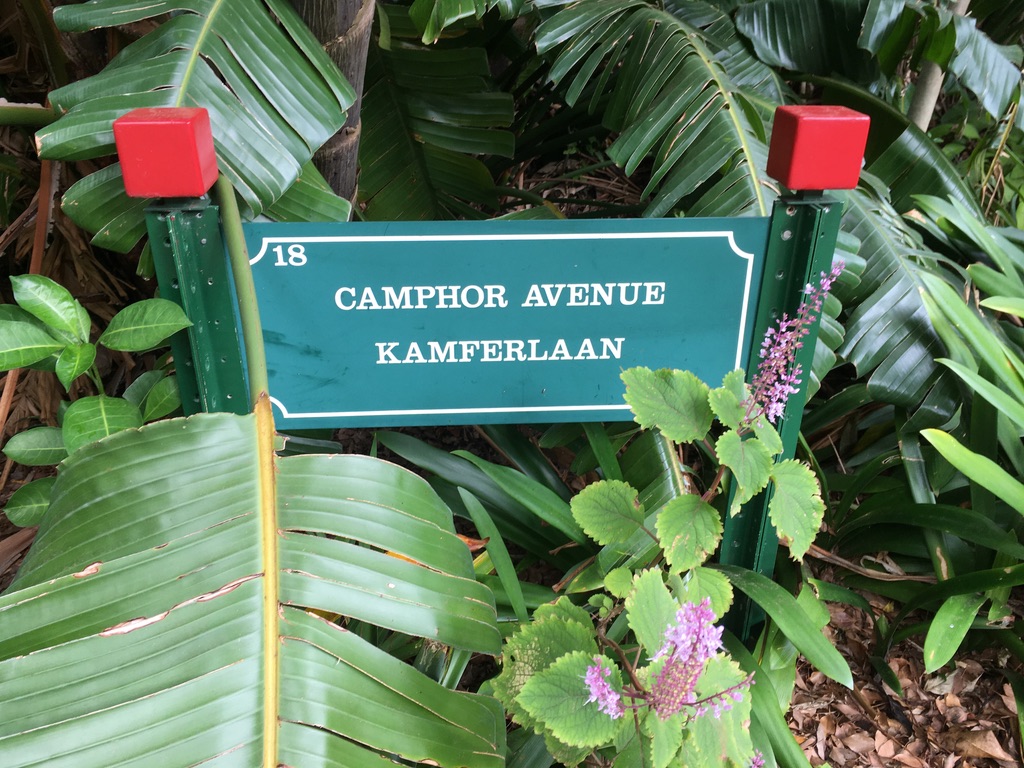
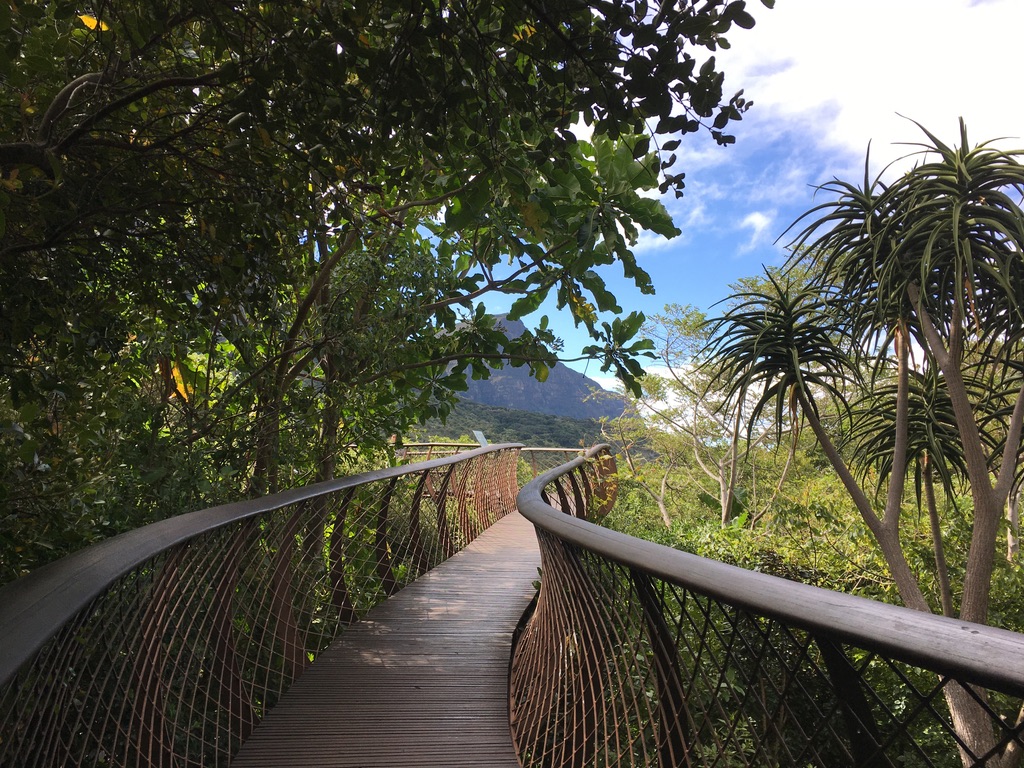
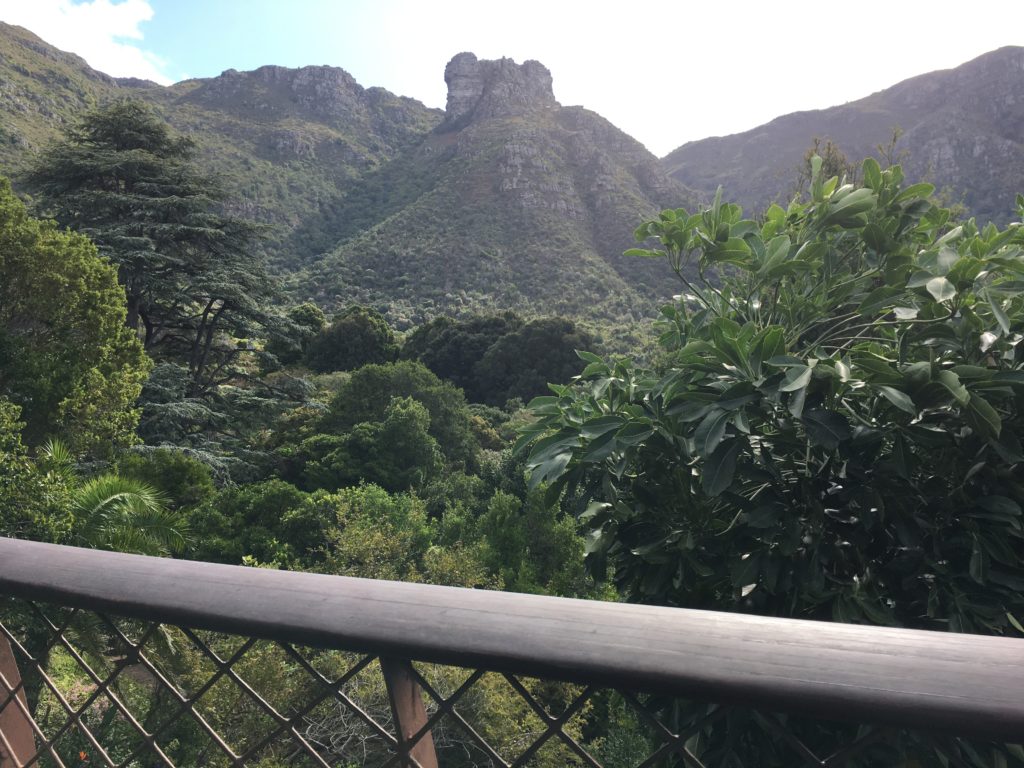
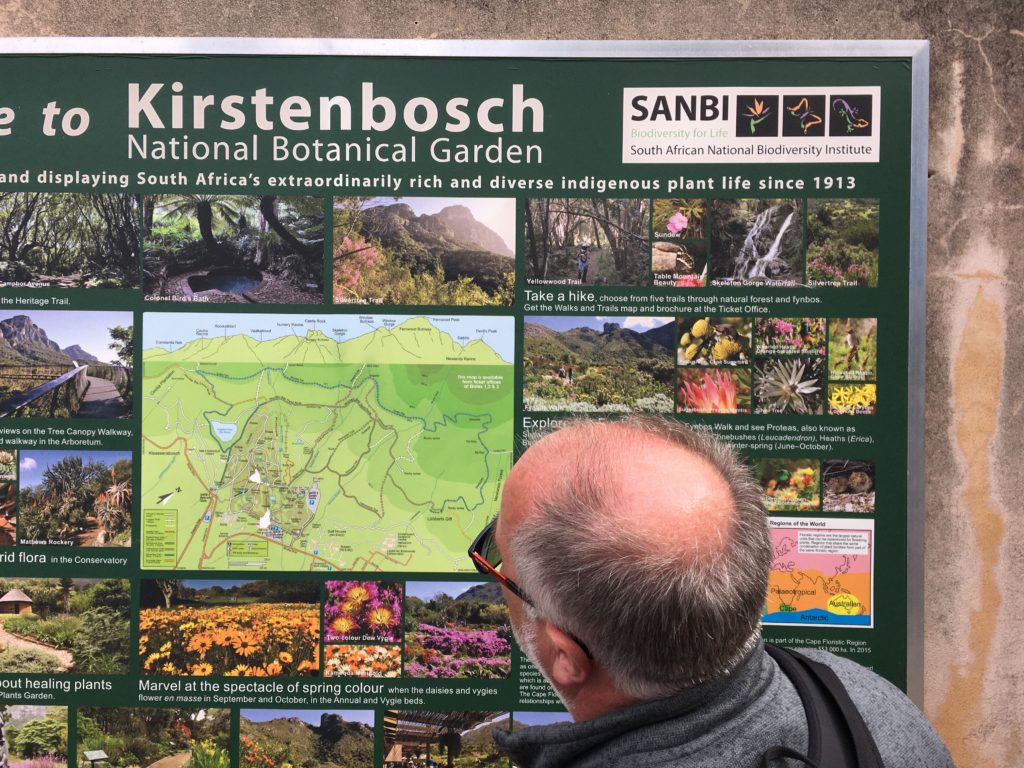
At the Royal Court Theatre that night saw a 23-year-old ventriloquist called Max Fullham with good puppetry skills and lots of cute in-jokes. But, notes, Max: not enough delineation between the characters. Need to be strict about what each character knows. If your main gag is that puppet ears can hear and puppet eyes can see, then a bare puppet head won’t have those abilities until their ears and eyes are available. But a youngster holding the attention of people older than his grandparents, that’s an achievement.
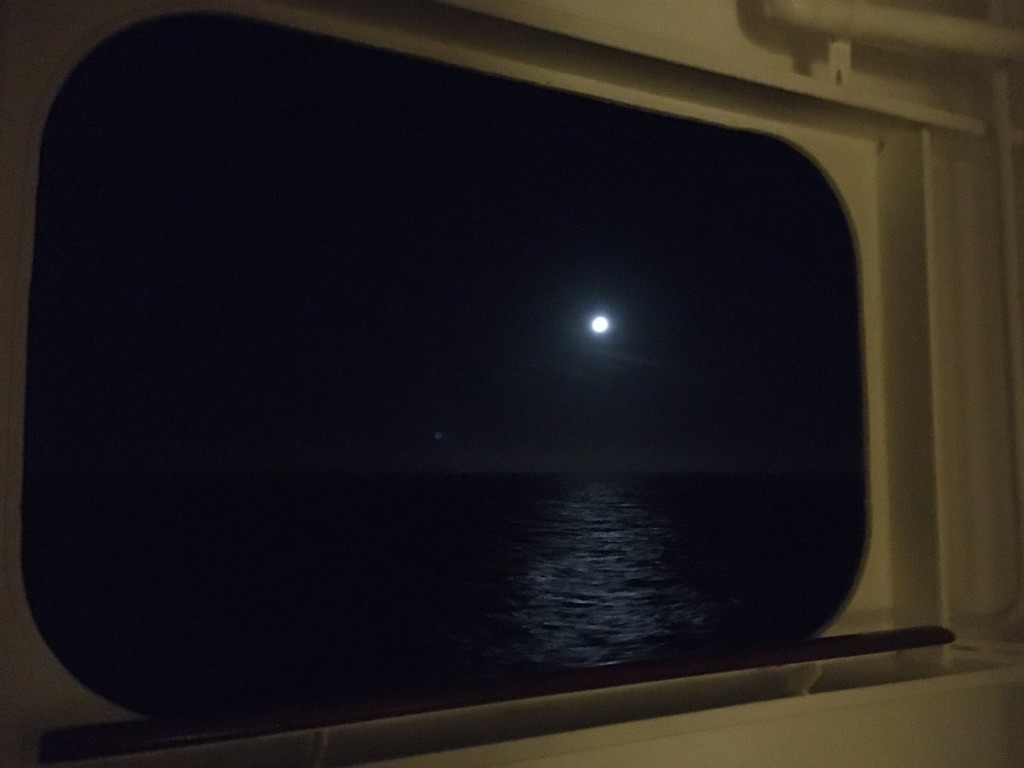
DAY 28 – at sea – left SA very late. I was awake to watch the delicate manoeuvres, reversing and exiting a slim margin into potentially dangerous winds. Because the side of the ship is so wide it can catch the wind and cause all sorts of trouble. We were five hours late and all safe.
Very strange to leave the cinema where I’d been immersed Benin’s landscape with Viola Davis in The Woman King – absorbed – beautiful moments – full on violence. I feel a sequel coming on. As I stood up to go, an elderly lady wearing a necklace of glittering stones behind me, the only other in the room, asked what the film had been as she’d been late. I told her and made admiring comments about the performances and story matter. She said it sounded interesting and thought she might like to stay for the second sitting. Did I think she’d like it? I asked if she liked violence? She said, ‘Oh no, not at all.’ I told her I didn’t think The Woman King was for her.
I listened to more of my talking book, Les Mis. So much information about Cosette’s nunnery. He bangs on, does our Victor. An info dump is still an info dump even if your book is a classic. At least I got through the battle of Waterloo – almost my Waterloo really. But the story of Cosette’s rescue is riveting. The greedy innkeeper vile, stubborn and persistent.
Richard saw me coming and sped off to fetch the hotcross bun. After some time, lucky Ann was there to chat with, he rushed up with two buns! I can’t really comment on the quality. The thought counted.
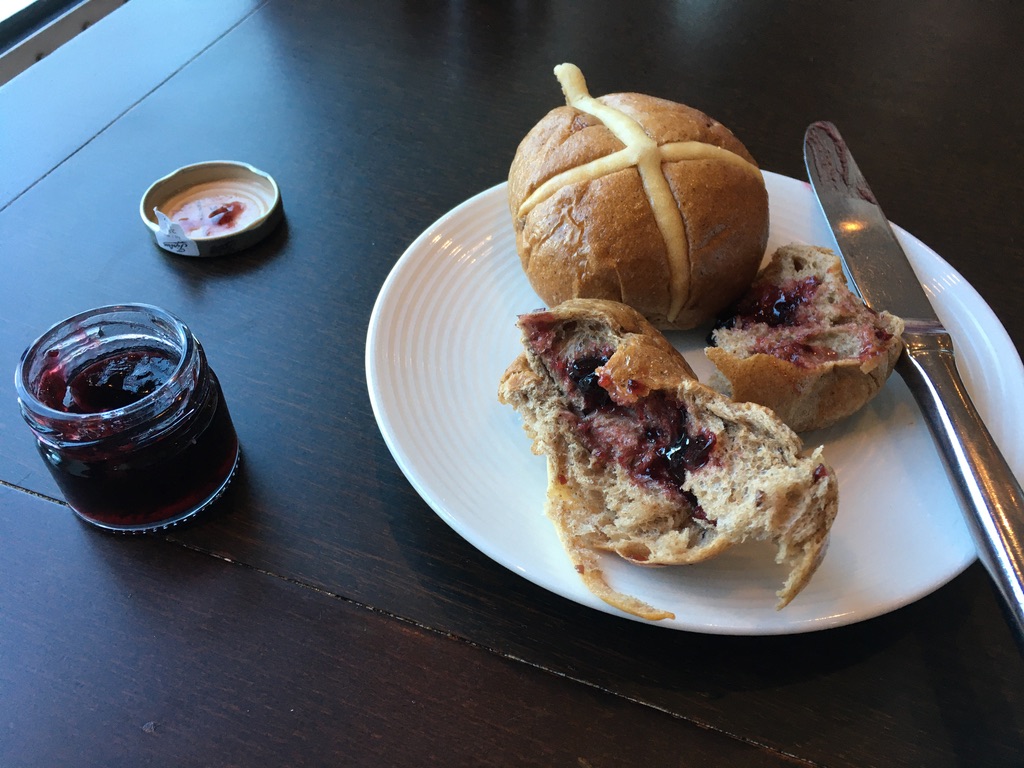
On the way to Namibia. It is surreal.
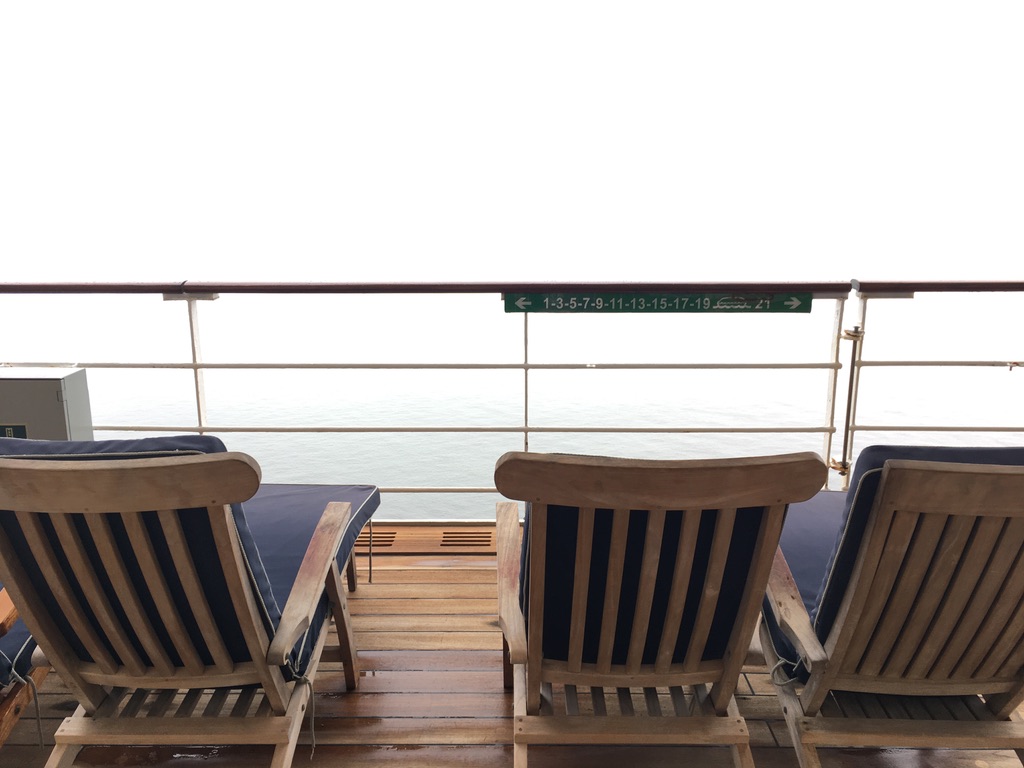
DAY 29 – NAMIBIA – WALVIS BAY – Africaan for Whale Bay
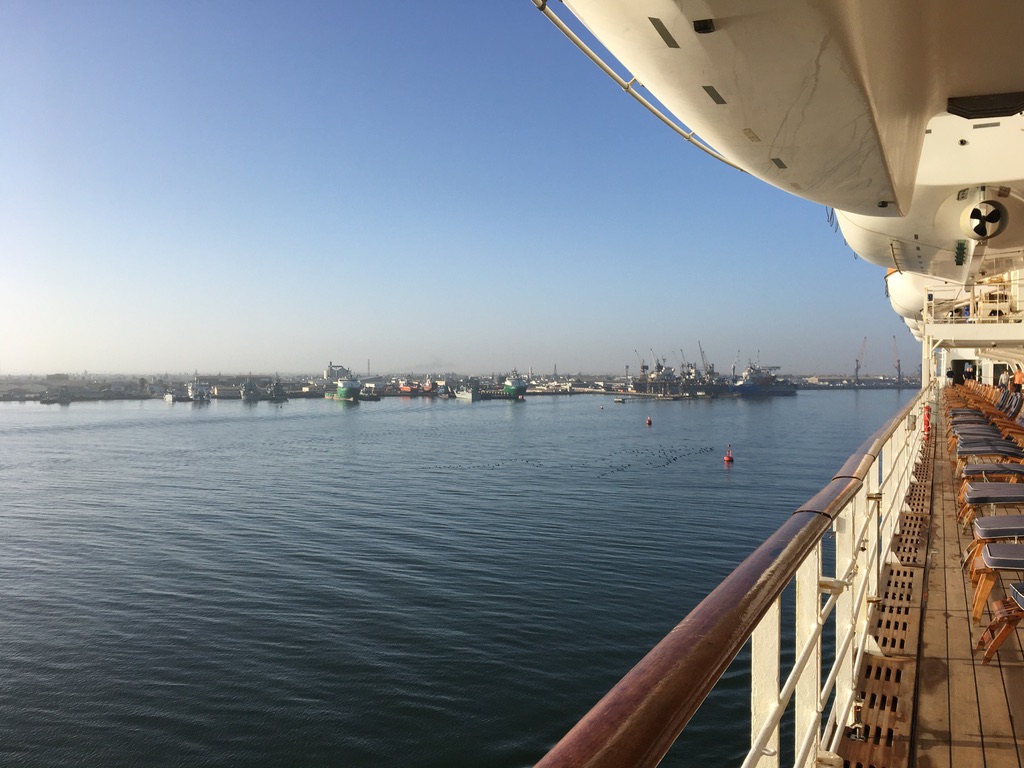
The port is the centrepiece of heavy industry. Surrounding that are new suburban estates and further out are sandy buildings and then there’s sand dunes and the desert.
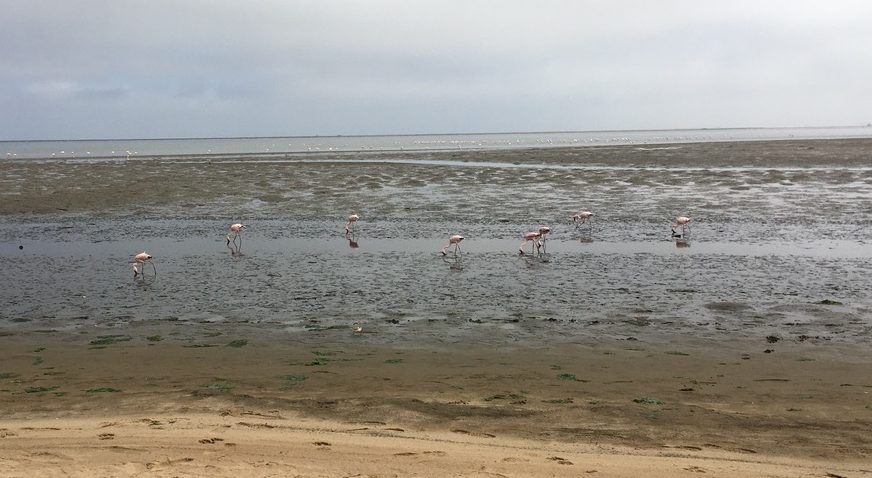
Very nice to begin our tour with striding flamingos in a lagoon. From tidal flats we were then taken to a dry dune. The specific tourist dune was closed for some anti-tourist reason so this one was given as our option, a popular destination for dune buggies, dune bikes and short walks. Our guide was more about the fun than the facts. She said it was her birthday. Was that fun enough for you? We dutifully clambered up the dune.
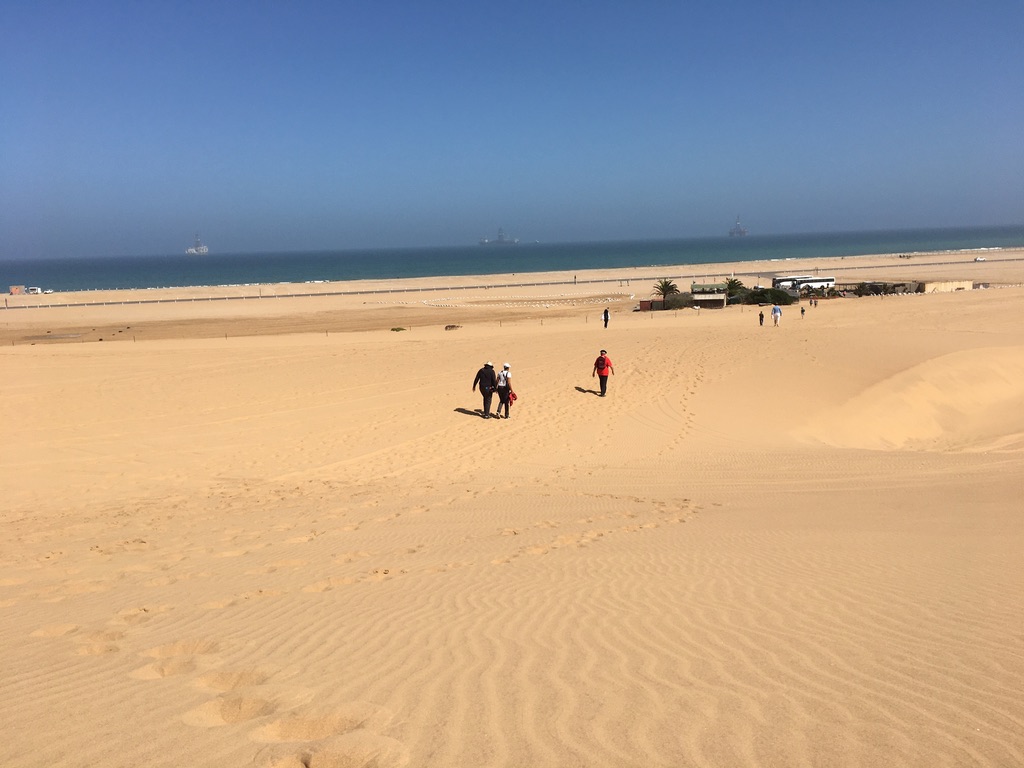
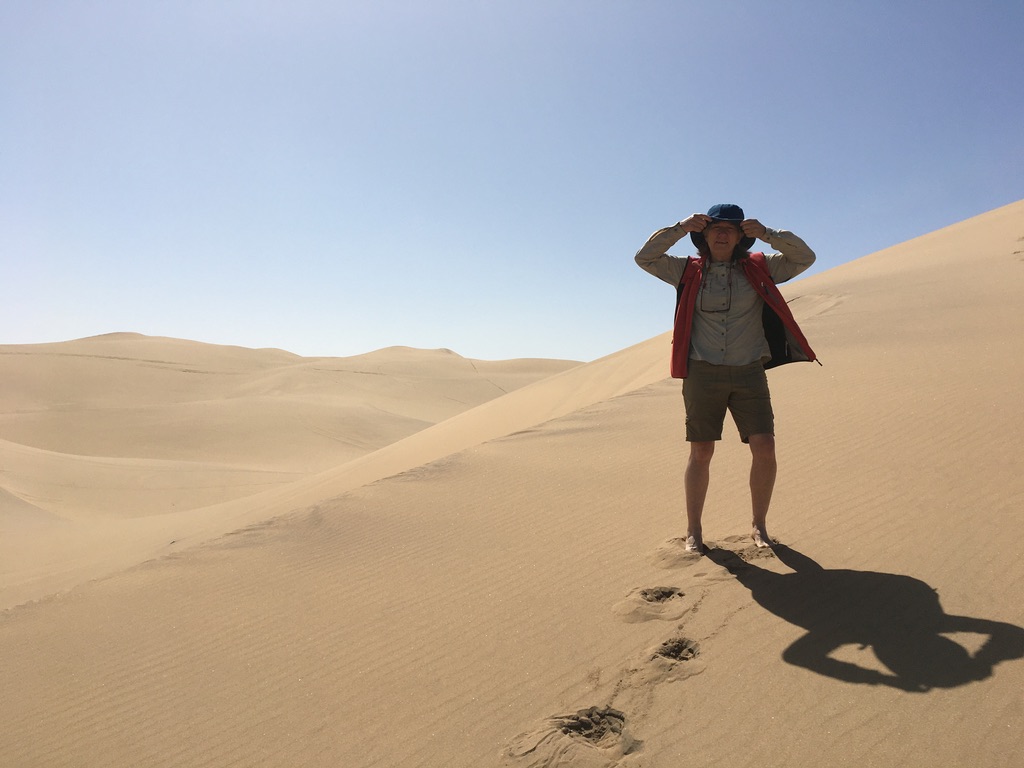

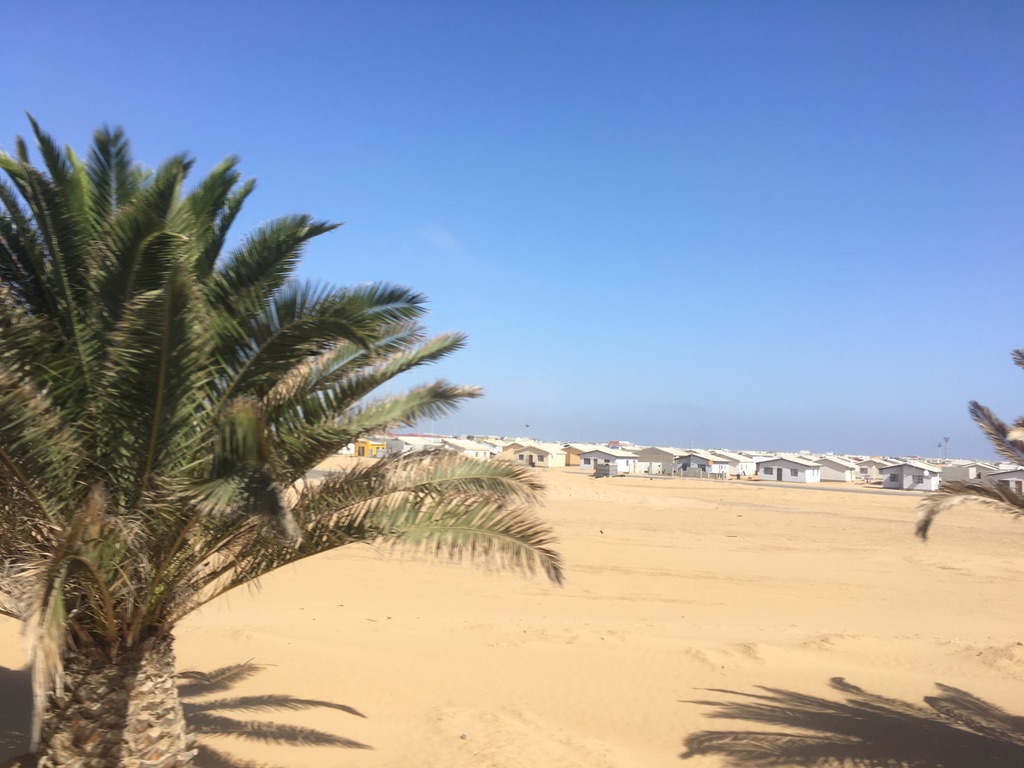
I wondered about some little marks I’d seen on the sand – away from the tracks and foot prints. The guide thought it could have been side winder snakes, black widow spiders or scorpions? If creatures live in the dunes should people be riding rough shod quad bikes over them? I guess where we walked in our little bare feet the scorpions would have been long squashed.
Then we were driven to a suburb organised by German settlers. Of course, as part of history they’re no longer allowed to alter colour or shape but Germans still pay a large part in education and development of Walvis Bay. We parked opposite an open air market where trinkets and fabrics could be bought from apparently authentically dressed tribal people. But if you went anywhere near, to pass to the museum, for instance, you were swamped by blokes crowding and pushing stuff at you and making continual suggestions about the provenance and quality of their wares, and, as a single female, I found it overwhelming enough to bypass entirely.
The museum was mildly interesting.
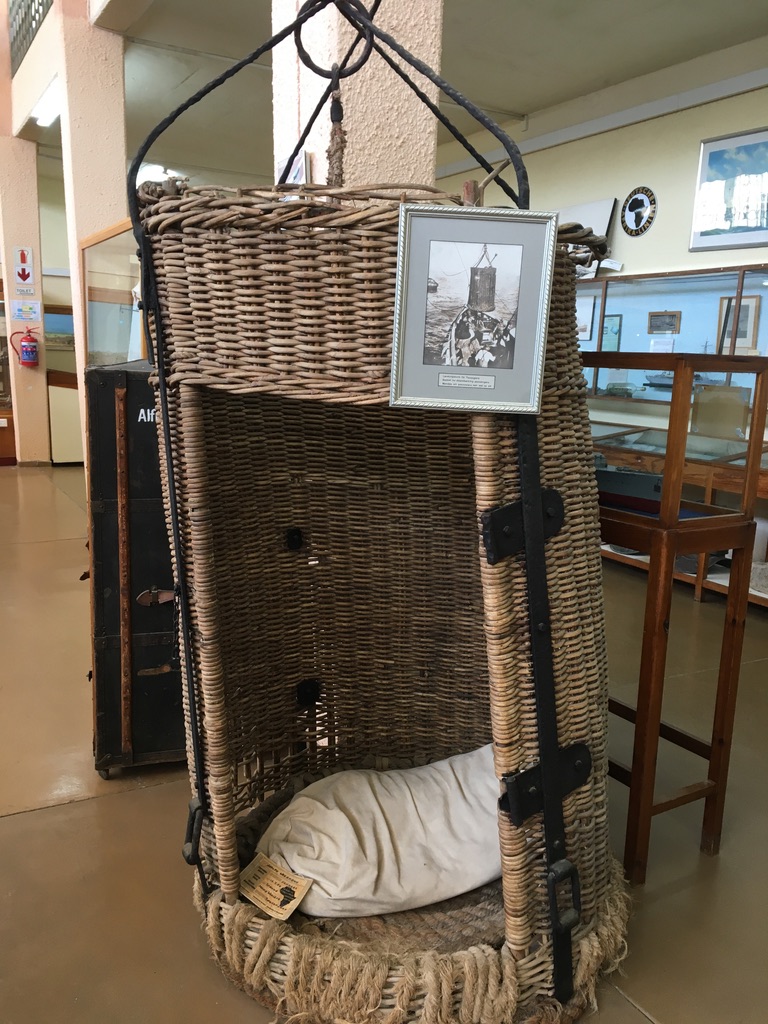
Ended up in a quiet, clean, touristy Made in Namibia shop. Paid top dollar for some hand printed cushion covers as a gift for son in Australia. Had delightful chat with woman behind till with long fingernails. She’d also enjoyed watching The Woman King and would love to work in the movies. I encouraged her to find out where the sure to be sequel would be made and, keen as, she put her long-nailed hand up. She would do it! She would even learn karate!
I have no idea why I chose that shore experience. I even forgot to mention the crystal museum – essentially a rock/gem shop – very boring but nice rocks. Avoid.
Elaine, one of our 680dotcom team, had chosen to visit a community where everyone lived in tiny tin and cardboard shacks. Andrew had been taken to a desert where a strange looking plant with only two leaves lived for hundreds of years. I went to a shopping centre and a museum with a fun guide. She did drop us off at the beach and encouraged us to photograph the sand. Then when we returned to the beach we enlarged the image to reveal hundreds of different minerals and coloured stones in the sand. She also pointed out the massive offshore ship repair unit. It looked like an oil rig from the distance, but apparently Namibia is known for the ability to run repairs on fishing vessels without them having to go into drydock.
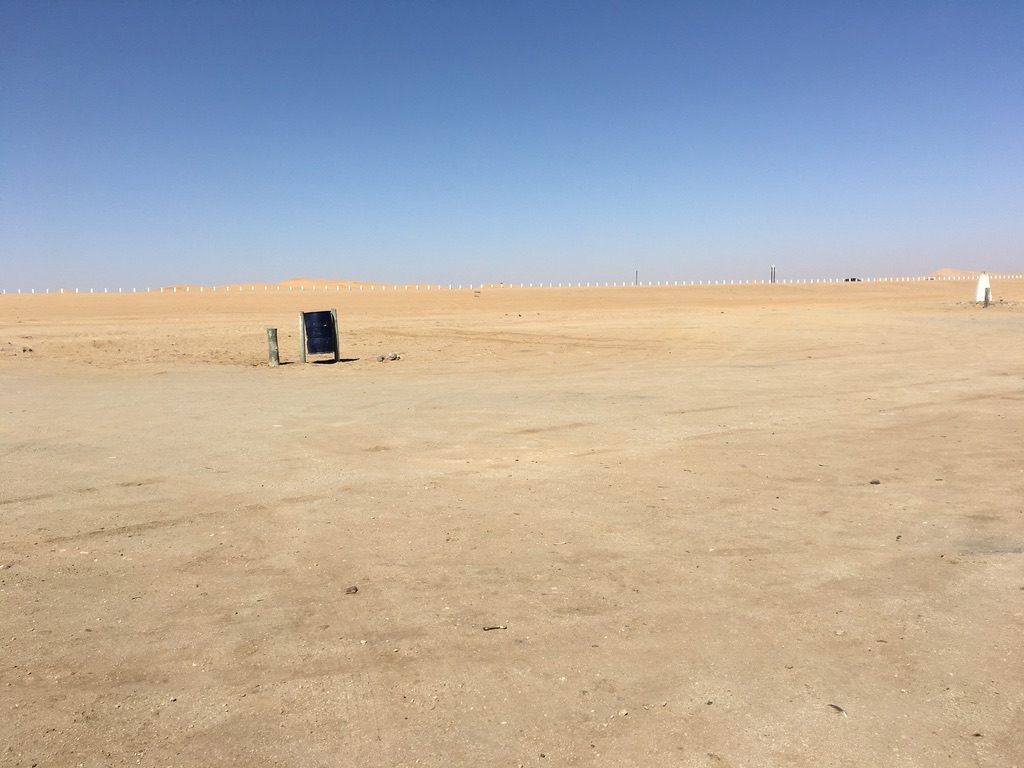
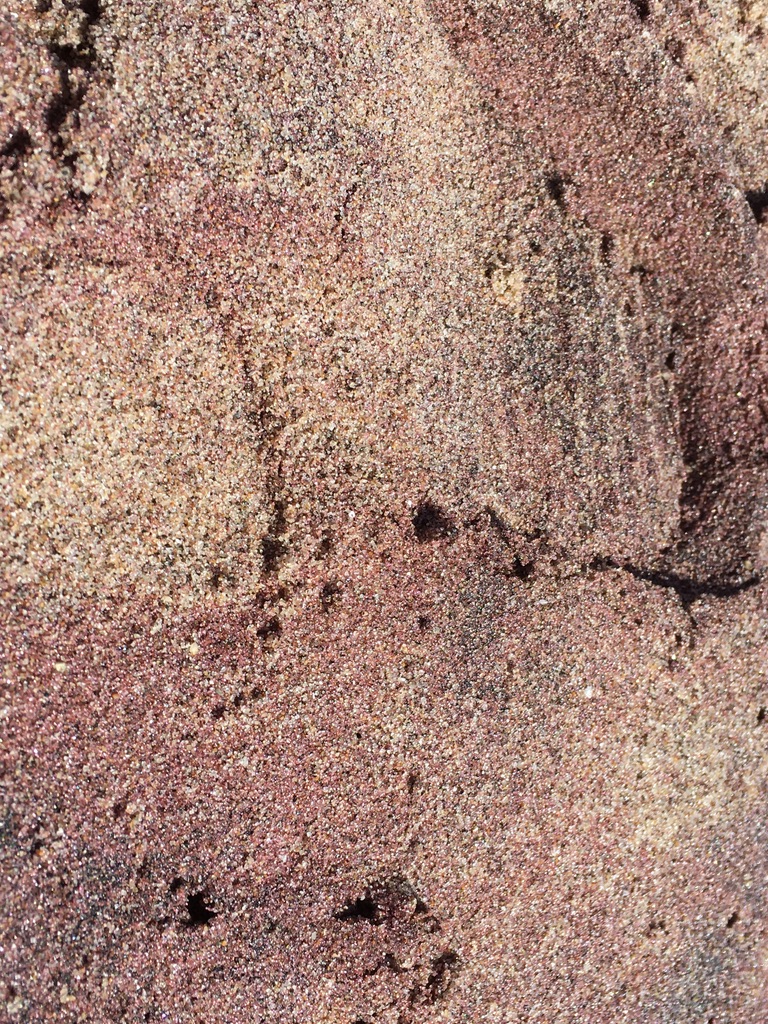
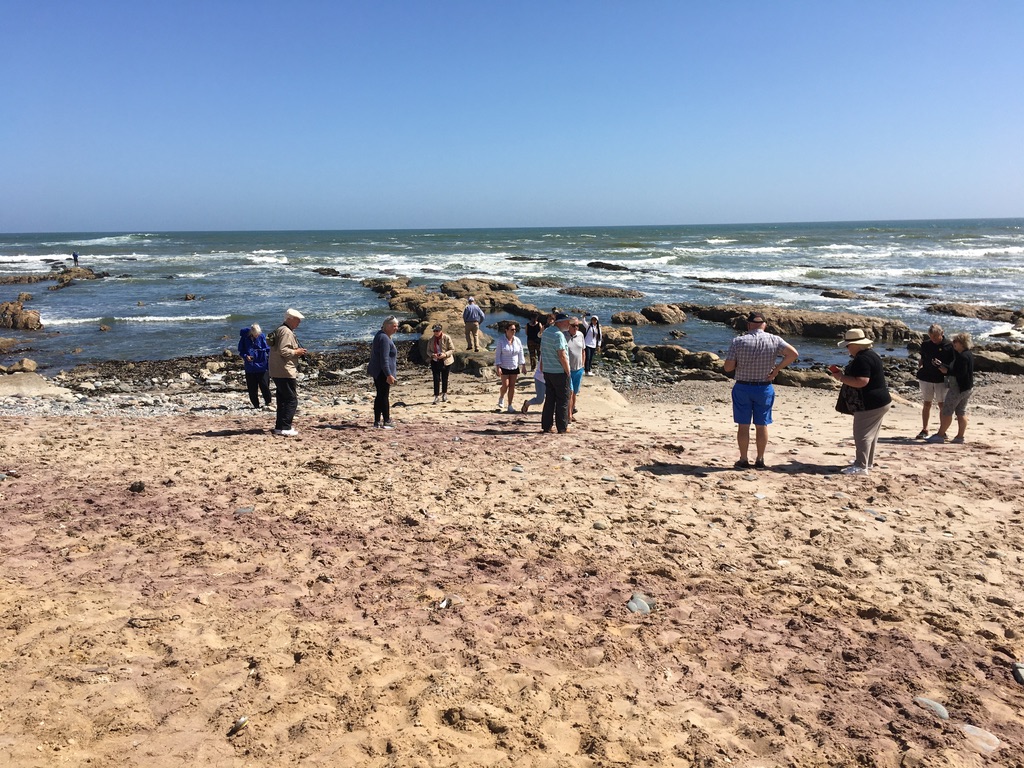
Namibia is also known for working with Sea Shepherd. Recently Walvis Bay was the scene of a dramatic search and seizure of shark fins.
The container cranes near our ship were lit with bright green. They look like Christmas dinosaurs with red eyes.
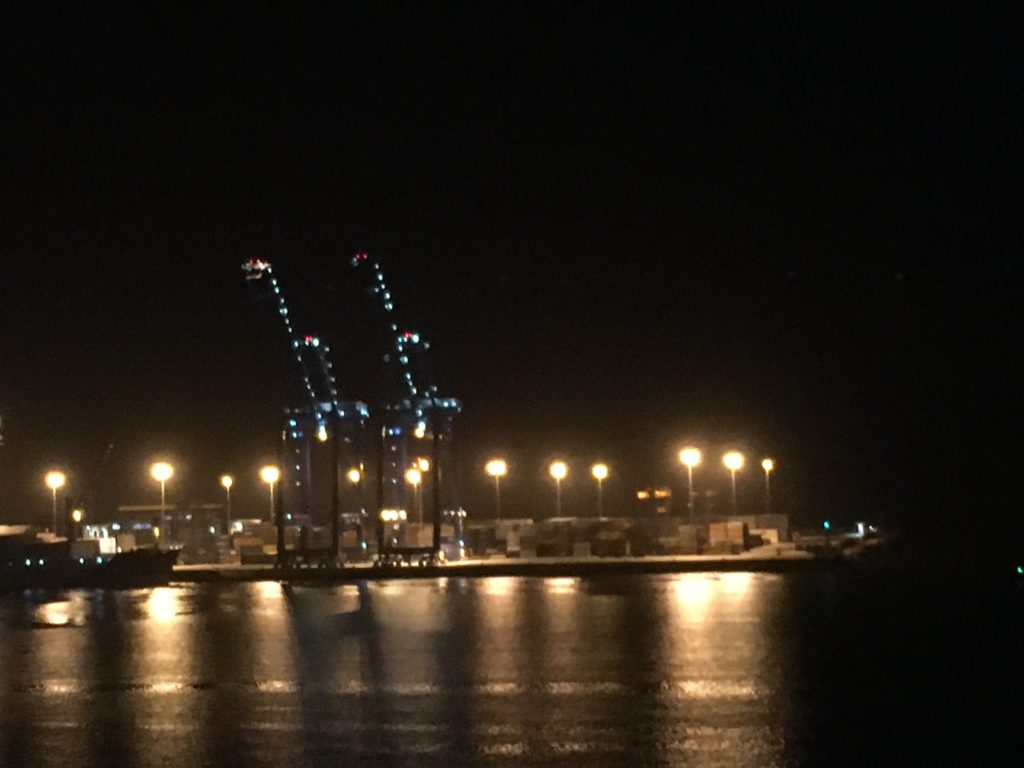
The Captain’s report on departure mentioned an almost 360 degree turn. It was certainly a remarkable thing to witness. I went up to the Observatory to stand directly over the bow as we proceeded out of the long, thin (130 metres across) shipping lane to get out of the bay. Taken slow and quiet on smooth waters, the journey was hypnotic and some of the buoys went by very close.
The next eight days would be all at sea.
To the Village Vegan, loved your African post. You deserved that hot cross bun. Was right there in the canoe with you, though I think Andrea and you were a good team. Namibia sounded interesting. The German influence is a huge contrast (and conflict) with the indigenous peoples. Tino and his family of 12 fled to Namibia (walked for over a week) from south Angola (Lubango) to escape from the Cuban rebels in 1975. An US chartered army plane rescued them and with the T-shirt’s on their back dropped them off in Lisbon during winter. The rest is history.
Looking forward to your European leg.
xMA
Gosh, MA, I just can’t imagine. How life twists and turns and how lucky Tino’s cruise work turned out to be.
Maaaarvelous, thankyou again. I’m going in for multiple aas whenever the whim takes me.
Hi Victoria Loved your write up but have missed the previous postings so will try to catch up. Love the idea is slow travel, hadn’t pictured you on a ‘cruise’ but enjoying seeing it through your lovely Aussie-Kiwi eyes and I’m sure you explain more in the previous posts x
It’s true, my nickname is ‘Most Unlikely Cruiser’! Glad you enjoyed it!